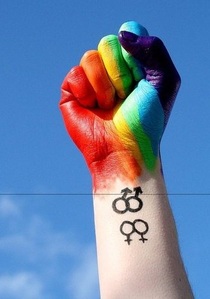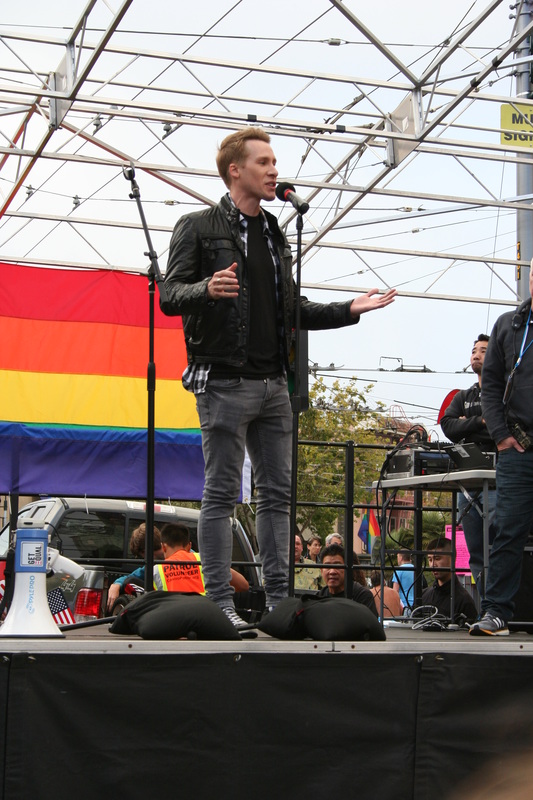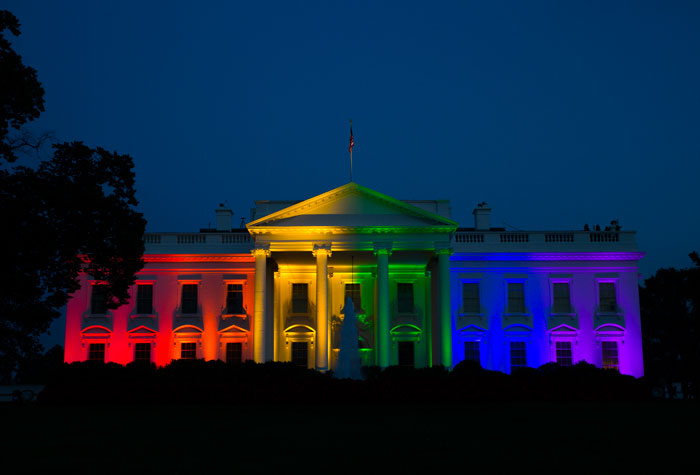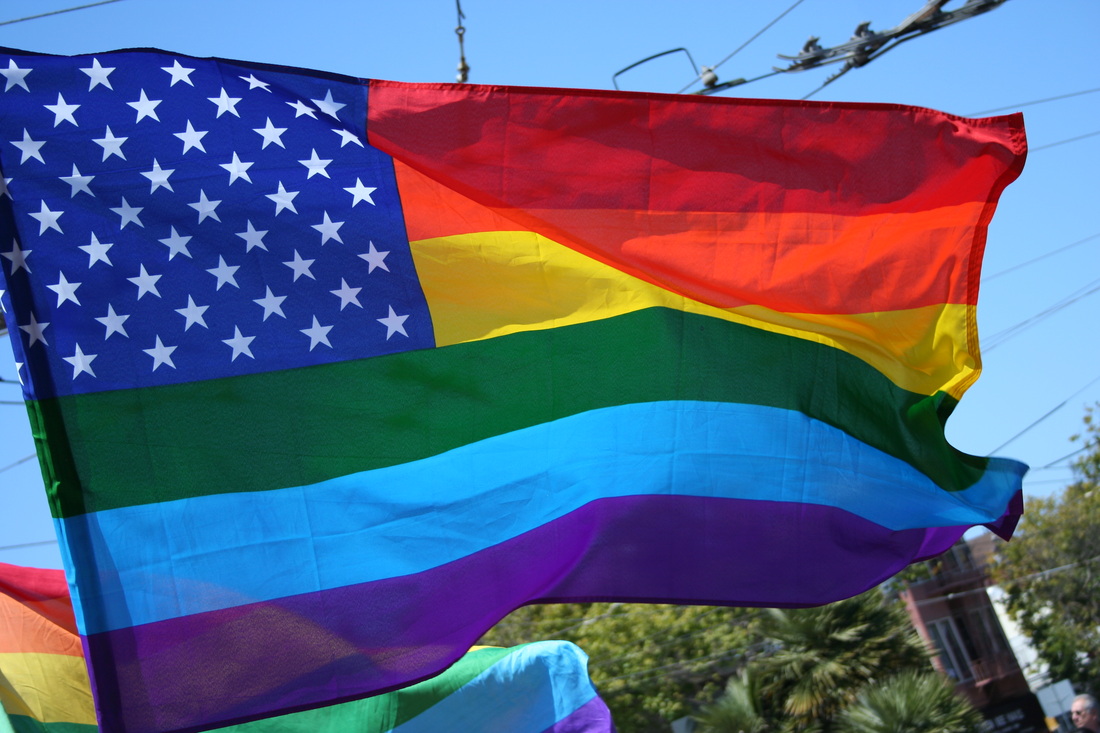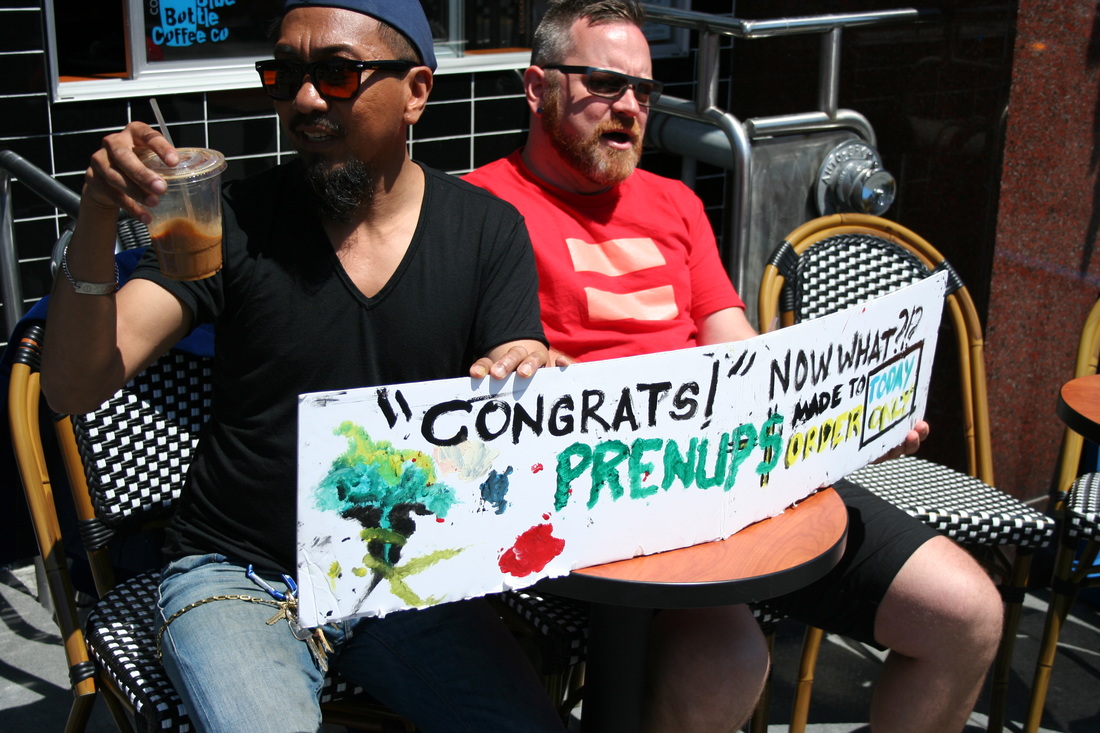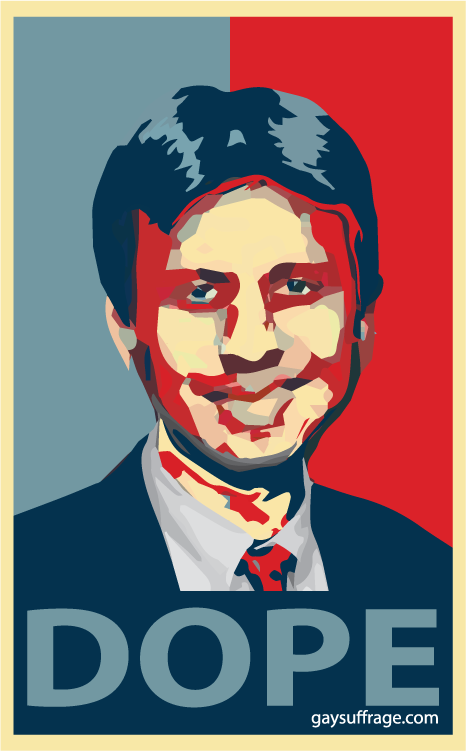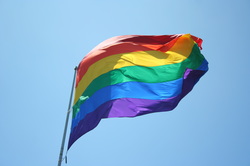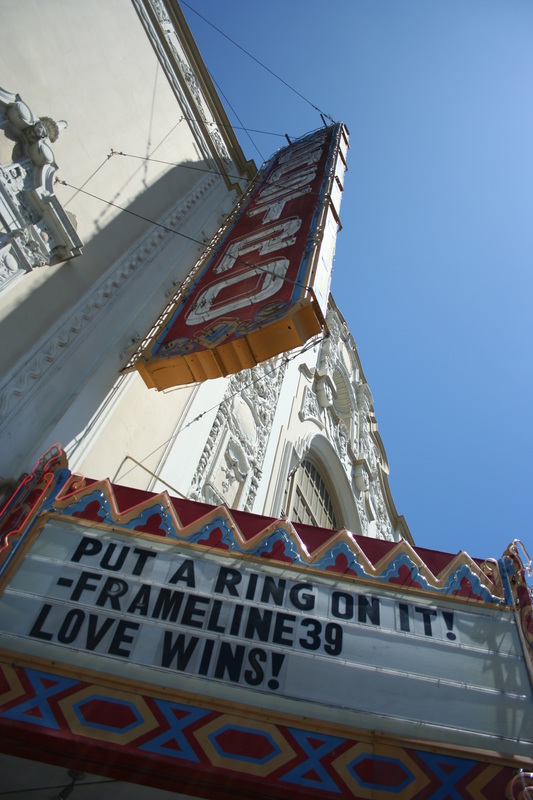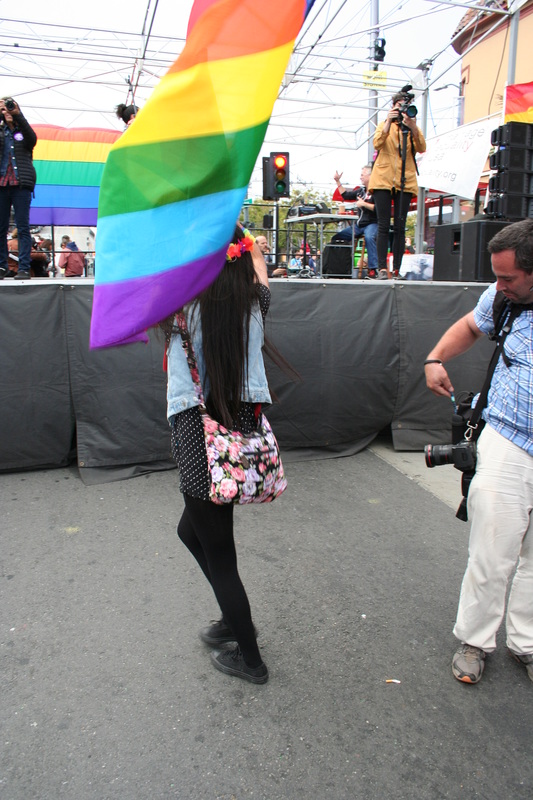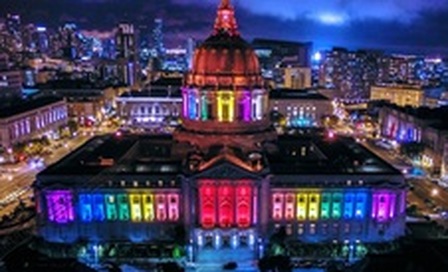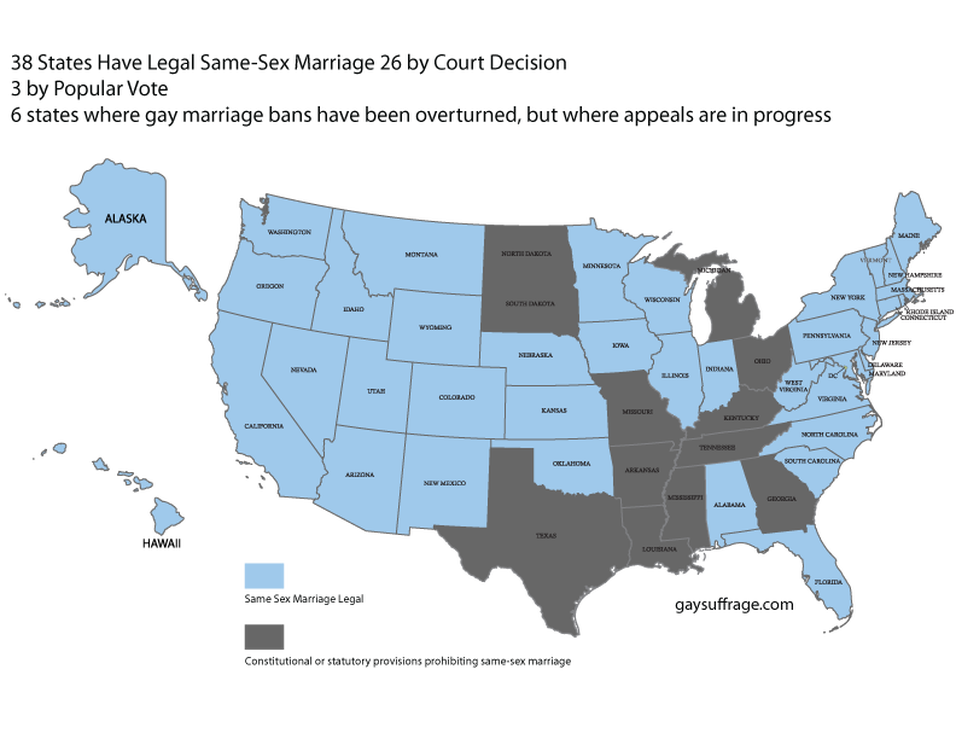PLEASE BE PATIENT AS WE LOAD THE ARCHIVES.
June 2015
|
By Randy Mistrot, gaysuffrage.com
In a landmark opinion, a divided Supreme Court on Friday ruled that same-sex couples can marry nationwide, establishing a new civil right and handing gay rights advocates a historic victory. In the 5-4 ruling, Justice Anthony Kennedy wrote for the majority with the four liberal justices. Each of the four conservative justices wrote their own dissent. Nearly 46 years to the day after a riot at New York's Stonewall Inn ushered in the modern gay rights movement, the decision could settle one of the major civil rights fights of this era. The language of Kennedy's opinion spoke eloquently of the most fundamental values of family, love and liberty. |
VG DAY
|
Enjoy our exclusive slide show
(use arrows for navigation)
NEWS BELOW THIS LINE WAS MADE BEFORE THE SUPREME COURT RULING IN FAVOR OF SAME-SEX MARRIAGE NATIONWIDE
some articles may not be available, items are not in chronological order .
N. Carolina's religious-exemption gay marriage bill now law
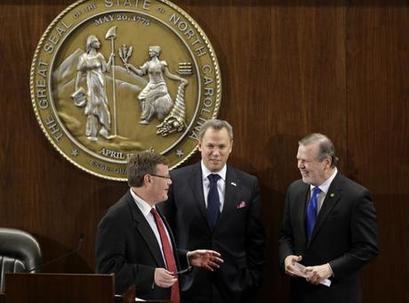
By GARY D. ROBERTSON & R. UEHARA MISTROT
RALEIGH, N.C.
A measure allowing some court officials to refuse to perform gay marriage responsibilities because of their religious beliefs became law in North Carolina on Thursday, but opponents said litigation challenging the new measure was likely to come soon.
The state House voted Thursday to override Republican Gov. Pat McCrory's veto of the bill, making the law effective immediately. The Senate voted to override last week.
North Carolina becomes the second state with such an exemption for court officials. Utah passed a similar one earlier this year.
The new law means some register of deeds workers who assemble licenses and magistrates to solemnize civil marriages can decide to stop performing all marriages if they hold a "sincerely held religious objection."
The law "protects sincerely held religious beliefs while also ensuring that magistrates are available in all jurisdictions to perform lawful marriages," House Speaker Tim Moore, R-Cleveland, said in a statement.
Gay rights groups and Democrats who opposed North Carolina's bill said after the vote that litigation was likely to be filed soon. Republicans supporting the measure said federal laws provided religious accommodations to government officials, in keeping with the U.S. and state constitutions.
Dr. Jesus Hernandez (L) and Oscar Hull (C) are married by Meredith Sloane (R), a minister officiant, …
McCrory had said no one who takes a government oath should be able to avoid performing the duties that it requires.
"It's a disappointing day for the rule of law and the process of passing legislation in North Carolina," McCrory said in a statement. McCrory had been unhappy with several days of delays before the override vote by House leaders, while Democrats complained that the GOP used a parliamentary maneuver Thursday to abridge debate.
The law says court officials who disclose a "sincerely held religious objection" must stop performing marriage duties for both gay and heterosexual couples for at least six months. The chief District Court judge or the county register of deeds — both elected officials — would fill in on marriages if needed.
Senate leader Phil Berger, R-Rockingham, introduced the bill shortly after federal rulings last October overturned North Carolina's voter-approved constitutional ban on gay marriage. Berger responded to several magistrates who resigned when the state's top court administrator wrote in a memo that those who declined to officiate for same-sex couples could be punished, terminated or face charges.
Providing religious accommodations are "the way employment law has worked for more than 50 years, and it was only in this misguided memo ... that even started this issue," said Rep. Paul Stam, R-Wake, a key supporter of the law.
Gov. Pat McCrory delivers his State of the State address to a joint session of the General Assembly, …
In his May 28 veto message, McCrory said many North Carolina residents, including him, believe marriage is between a man and a woman. But "no public official who voluntarily swears to support and defend the Constitution and to discharge all duties of their office should be exempt from upholding that oath," McCrory wrote.
The Senate overturned McCrory's veto quickly, but House Republicans put off a vote because some supporters of the original bill were absent. Others were on the fence, according to lawmakers.
Opponents said the bill created a new form of discrimination similar to biases of a generation ago against multiracial marriages. They also said the bill didn't prevent delays for gay couples getting married if a court official suddenly disclosed a religious objection when a couple approached the office counter of the magistrate or a register, particularly in smaller counties with smaller staffs.
The state ACLU urged people who encountered "new hurdles" getting married to contact its office. "This shameful backlash against equality will make it harder for all couples in our state to marry," state Executive Director Sarah Preston said.
Rep. Cecil Brockman, D-Guilford, apologized to all lesbian and gay couples in North Carolina for the House's action. "Your love is not different than anybody else's love in this state," he said at a news conference. His attempt to apologize publicly on the House floor after the vote was ruled out of order by Moore and halted.
McCrory's decision put him at odds with social conservatives aligned with Republicans. Concerned Women for America accused McCrory of betraying state residents and forcing court officials to violate their consciences.
"It's hard to believe that any governor — much less a conservative one — would veto a bill protecting the religious freedoms of his constituents," North Carolina Values Coalition Executive Director Tami Fitzgerald said.
Thursday's House vote of 69-41 was just over the three-fifths majority needed. Ten House members were absent and didn't vote. Three Democrats joined all but three Republicans present in voting for the override.
RALEIGH, N.C.
A measure allowing some court officials to refuse to perform gay marriage responsibilities because of their religious beliefs became law in North Carolina on Thursday, but opponents said litigation challenging the new measure was likely to come soon.
The state House voted Thursday to override Republican Gov. Pat McCrory's veto of the bill, making the law effective immediately. The Senate voted to override last week.
North Carolina becomes the second state with such an exemption for court officials. Utah passed a similar one earlier this year.
The new law means some register of deeds workers who assemble licenses and magistrates to solemnize civil marriages can decide to stop performing all marriages if they hold a "sincerely held religious objection."
The law "protects sincerely held religious beliefs while also ensuring that magistrates are available in all jurisdictions to perform lawful marriages," House Speaker Tim Moore, R-Cleveland, said in a statement.
Gay rights groups and Democrats who opposed North Carolina's bill said after the vote that litigation was likely to be filed soon. Republicans supporting the measure said federal laws provided religious accommodations to government officials, in keeping with the U.S. and state constitutions.
Dr. Jesus Hernandez (L) and Oscar Hull (C) are married by Meredith Sloane (R), a minister officiant, …
McCrory had said no one who takes a government oath should be able to avoid performing the duties that it requires.
"It's a disappointing day for the rule of law and the process of passing legislation in North Carolina," McCrory said in a statement. McCrory had been unhappy with several days of delays before the override vote by House leaders, while Democrats complained that the GOP used a parliamentary maneuver Thursday to abridge debate.
The law says court officials who disclose a "sincerely held religious objection" must stop performing marriage duties for both gay and heterosexual couples for at least six months. The chief District Court judge or the county register of deeds — both elected officials — would fill in on marriages if needed.
Senate leader Phil Berger, R-Rockingham, introduced the bill shortly after federal rulings last October overturned North Carolina's voter-approved constitutional ban on gay marriage. Berger responded to several magistrates who resigned when the state's top court administrator wrote in a memo that those who declined to officiate for same-sex couples could be punished, terminated or face charges.
Providing religious accommodations are "the way employment law has worked for more than 50 years, and it was only in this misguided memo ... that even started this issue," said Rep. Paul Stam, R-Wake, a key supporter of the law.
Gov. Pat McCrory delivers his State of the State address to a joint session of the General Assembly, …
In his May 28 veto message, McCrory said many North Carolina residents, including him, believe marriage is between a man and a woman. But "no public official who voluntarily swears to support and defend the Constitution and to discharge all duties of their office should be exempt from upholding that oath," McCrory wrote.
The Senate overturned McCrory's veto quickly, but House Republicans put off a vote because some supporters of the original bill were absent. Others were on the fence, according to lawmakers.
Opponents said the bill created a new form of discrimination similar to biases of a generation ago against multiracial marriages. They also said the bill didn't prevent delays for gay couples getting married if a court official suddenly disclosed a religious objection when a couple approached the office counter of the magistrate or a register, particularly in smaller counties with smaller staffs.
The state ACLU urged people who encountered "new hurdles" getting married to contact its office. "This shameful backlash against equality will make it harder for all couples in our state to marry," state Executive Director Sarah Preston said.
Rep. Cecil Brockman, D-Guilford, apologized to all lesbian and gay couples in North Carolina for the House's action. "Your love is not different than anybody else's love in this state," he said at a news conference. His attempt to apologize publicly on the House floor after the vote was ruled out of order by Moore and halted.
McCrory's decision put him at odds with social conservatives aligned with Republicans. Concerned Women for America accused McCrory of betraying state residents and forcing court officials to violate their consciences.
"It's hard to believe that any governor — much less a conservative one — would veto a bill protecting the religious freedoms of his constituents," North Carolina Values Coalition Executive Director Tami Fitzgerald said.
Thursday's House vote of 69-41 was just over the three-fifths majority needed. Ten House members were absent and didn't vote. Three Democrats joined all but three Republicans present in voting for the override.
N.C. Governor Vetoes Bill on Religious Objection to Gay Marriage
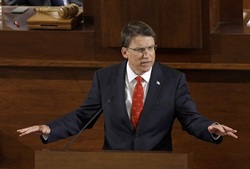
The legislature must decide whether to override that veto(RALEIGH, N.C.) — North Carolina Gov. Pat McCrory has vetoed a religious exemption bill that would allow some court officials to avoid gay marriage duties.
The Republican governor announced his decision Thursday — hours after lawmakers gave their final approval to the measure. His office says he vetoed it shortly after the announcement. The legislature must decide whether to override that veto.
The bill gives magistrates and some register of deeds workers the ability to avoid duties for all marriages if they have a “sincerely held religious objection.”
McCrory says he believes public officials who swear to support and defend the Constitution and to carry out their duties shouldn’t be exempt from upholding their oath.
The House and Senate both have passed the bill by margins above the threshold needed to overri
de a veto.
The Republican governor announced his decision Thursday — hours after lawmakers gave their final approval to the measure. His office says he vetoed it shortly after the announcement. The legislature must decide whether to override that veto.
The bill gives magistrates and some register of deeds workers the ability to avoid duties for all marriages if they have a “sincerely held religious objection.”
McCrory says he believes public officials who swear to support and defend the Constitution and to carry out their duties shouldn’t be exempt from upholding their oath.
The House and Senate both have passed the bill by margins above the threshold needed to overri
de a veto.
Kentucky Governor Uses Jedi Mind Tricks to Defend Gay-Marriage Ban
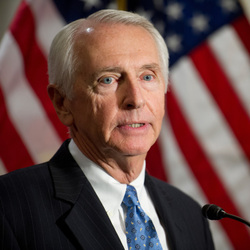
On Tuesday, the governor of Kentucky floated a creative new defense of the state's gay-marriage ban: It's not discriminatory, because nobody can have a same-sex marriage, not even straight people! Hmmm, that's a new one.
In a brief filed with the U.S. Supreme Court, Governor Steve Beshear argued through his lawyer that Kentucky's ban on same-sex marriages is non-discriminatory because"men and women, whether heterosexual or homosexual, cannot marry persons of the same sex." Whoa, he's really got you there, gay-marriage advocates.
Incidentally, according to the Courier-Journal, it's the same logically twisted argument Virginia made 50 years ago in its attempt to uphold a ban on interracial marriage. Fifty years from now, once Millennials have effectively wiped out homophobia, we expect some southern governor to make the same argument about human-robot marriage.
In a brief filed with the U.S. Supreme Court, Governor Steve Beshear argued through his lawyer that Kentucky's ban on same-sex marriages is non-discriminatory because"men and women, whether heterosexual or homosexual, cannot marry persons of the same sex." Whoa, he's really got you there, gay-marriage advocates.
Incidentally, according to the Courier-Journal, it's the same logically twisted argument Virginia made 50 years ago in its attempt to uphold a ban on interracial marriage. Fifty years from now, once Millennials have effectively wiped out homophobia, we expect some southern governor to make the same argument about human-robot marriage.
NCAA 'concerned' over Indiana law that allows biz to reject gays
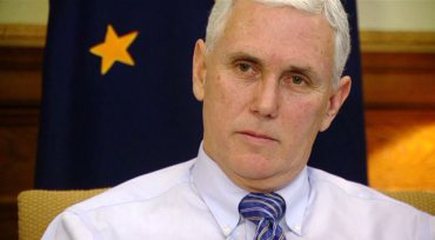
Washington (CNN)
Indiana Gov. Mike Pence's decision to sign into law a measure that could allow businesses to turn away gay and lesbian customers in the name of "religious freedom" has left the NCAA fretting ahead of next week's men's basketball Final Four in Indianapolis.
"We are especially concerned about how this legislation could affect our student-athletes and employees," NCAA President Mark Emmert said in a statement Thursday afternoon.
He said the NCAA will "work diligently" to ensure competitors and visitors at next week's Final Four are not "negatively impacted by this bill." Emmert also said the organization, which is based in Indianapolis, will "closely examine the implications of this bill and how it might affect future events as well as our workforce."
Indiana is the first state this year to enact a measure that's being pushed in a dozen others, and Emmert's comments were just the latest in a series of stinging criticisms issued after Pence signed the bill in a private ceremony with Republican state legislators and socially conservative lobbyists Thursday morning.
Already, the gamer convention Gen Con and the Disciples of Christ church group had threatened to pull their conventions out of Indianapolis. Tech giant Salesforce said it would halt its plans to expand in the state, too.
The NCAA had hinted for days that the bill -- which has the effect of allowing businesses to challenge local laws that forbid discriminating against customers based on sexual orientation in court -- could damage the city's reputation as a host of major sporting events.
Jason Collins, who last year became the first openly gay active NBA player, asked Pence in a tweet whether it is "going to be legal for someone to discriminate against me & others when we come" to the Final Four.
Still, Pence signed the bill in his office Thursday. In a statement explaining his decision, he pointed to President Barack Obama's health care law -- which triggered a lawsuit by Hobby Lobby to ensure the company wasn't required to cover birth control through its employees' health insurance plans.
READ: Ben Carson calls Obama a 'psychopath'
"The Constitution of the United States and the Indiana Constitution both provide strong recognition of the freedom of religion but today, many people of faith feel their religious liberty is under attack by government action," Pence said.
The move comes as Pence considers a bid for the 2016 Republican presidential nomination -- and just a year after Pence and socially conservative lawmakers lost their first policy battle against gay Hoosiers. In 2014 they had sought to amend Indiana's constitution to ban same-sex marriages -- but were beaten back by a highly-organized coalition of Democrats, traditionally right-leaning business organizations and fiscally focused supporters of Pence's predecessor, former GOP Gov. Mitch Daniels.
This year, though, the Republican-dominated state House and Senate both approved the "religious freedom" bill -- in part because it didn't receive the kind of public attention the gay marriage ban had drawn until it was already close to landing on Pence's desk.
Pence said in an interview with the WIBC radio station in Indianapolis on Thursday that the new law became controversial "because of the way some in the media have reported this."
Without referencing gay rights directly, he insisted that "this is not about any contemporary issue."
"This was a measure that frankly, Indiana should have enacted many years ago," Pence said. "It gives our courts guidance about evaluating government action and puts the highest standard -- it essentially says, if a government is going to compel you to act in a way that violates your religious beliefs, there has to be a compelling state interest."
Indiana doesn't currently have a law on the books protecting Hoosiers from discrimination based on sexual orientation. But a dozen counties do -- and opponents of the "religious freedom" law have said they're worried the new measure will be used to allow businesses to get around those local rules.
"The way the media has covered this in certain quarters -- I understand the concern that people feel," Pence told WIBC, pointing to the early-1990s congressional adoption of a federal Religious Freedom Restoration Act.
Pence tried to downplay the law's impact Thursday, but his allies who pushed it in the legislature -- led by Eric Miller, the head of Advance America and a powerful lobbyist on socially conservative issues in Indiana, who stood behind Pence at Thursday's bill signing ceremony -- touted the protections it affords businesses against gays, lesbians and transgender Hoosiers.
On his website, Miller highlighted examples of the law's effect: Christian bakers, florists and photographers won't have to participate in "homosexual marriage," he wrote, while Christian businesses won't be punished for "refusing to allow a man to use the women's restroom."
If Pence decides to mount a dark horse presidential bid -- which looks increasingly unlikely as candidates like Wisconsin Gov. Scott Walker court the same supporters he would need -- the "religious freedom" bill could give him a boost among GOP primary voters, especially in socially conservative states like Iowa.
That right wing support had slipped after Pence, who built reputation during 12 years in Congress as a die-hard social conservative, broke from his party's orthodoxy earlier this year as governor and launched an expansion of Medicaid coverage -- with some conservative tweaks -- under President Barack Obama's health care law.
But signing the "religious freedom" bill could also badly damage his prospects in a general election, where polls have shown that voters increasingly oppose policies that discriminate against gays and lesbians.
Proponents have argued the bill doesn't target gays and lesbians specifically -- but that it does protect businesses that don't support same-sex marriage from having to provide services for those ceremonies.
Eighteen others have similar measures on the books, and social conservatives have been re-energized in their push for "religious freedom" laws after the Supreme Court's decision in a health care-related case that allowed Hobby Lobby and other businesses to opt not to provide insurance coverage for contraception.
Also fueling the push: The Supreme Court's expected ruling in June on whether same-sex marriage is constitutionally protected and therefore legal in all 50 states. to edit.
Indiana Gov. Mike Pence's decision to sign into law a measure that could allow businesses to turn away gay and lesbian customers in the name of "religious freedom" has left the NCAA fretting ahead of next week's men's basketball Final Four in Indianapolis.
"We are especially concerned about how this legislation could affect our student-athletes and employees," NCAA President Mark Emmert said in a statement Thursday afternoon.
He said the NCAA will "work diligently" to ensure competitors and visitors at next week's Final Four are not "negatively impacted by this bill." Emmert also said the organization, which is based in Indianapolis, will "closely examine the implications of this bill and how it might affect future events as well as our workforce."
Indiana is the first state this year to enact a measure that's being pushed in a dozen others, and Emmert's comments were just the latest in a series of stinging criticisms issued after Pence signed the bill in a private ceremony with Republican state legislators and socially conservative lobbyists Thursday morning.
Already, the gamer convention Gen Con and the Disciples of Christ church group had threatened to pull their conventions out of Indianapolis. Tech giant Salesforce said it would halt its plans to expand in the state, too.
The NCAA had hinted for days that the bill -- which has the effect of allowing businesses to challenge local laws that forbid discriminating against customers based on sexual orientation in court -- could damage the city's reputation as a host of major sporting events.
Jason Collins, who last year became the first openly gay active NBA player, asked Pence in a tweet whether it is "going to be legal for someone to discriminate against me & others when we come" to the Final Four.
Still, Pence signed the bill in his office Thursday. In a statement explaining his decision, he pointed to President Barack Obama's health care law -- which triggered a lawsuit by Hobby Lobby to ensure the company wasn't required to cover birth control through its employees' health insurance plans.
READ: Ben Carson calls Obama a 'psychopath'
"The Constitution of the United States and the Indiana Constitution both provide strong recognition of the freedom of religion but today, many people of faith feel their religious liberty is under attack by government action," Pence said.
The move comes as Pence considers a bid for the 2016 Republican presidential nomination -- and just a year after Pence and socially conservative lawmakers lost their first policy battle against gay Hoosiers. In 2014 they had sought to amend Indiana's constitution to ban same-sex marriages -- but were beaten back by a highly-organized coalition of Democrats, traditionally right-leaning business organizations and fiscally focused supporters of Pence's predecessor, former GOP Gov. Mitch Daniels.
This year, though, the Republican-dominated state House and Senate both approved the "religious freedom" bill -- in part because it didn't receive the kind of public attention the gay marriage ban had drawn until it was already close to landing on Pence's desk.
Pence said in an interview with the WIBC radio station in Indianapolis on Thursday that the new law became controversial "because of the way some in the media have reported this."
Without referencing gay rights directly, he insisted that "this is not about any contemporary issue."
"This was a measure that frankly, Indiana should have enacted many years ago," Pence said. "It gives our courts guidance about evaluating government action and puts the highest standard -- it essentially says, if a government is going to compel you to act in a way that violates your religious beliefs, there has to be a compelling state interest."
Indiana doesn't currently have a law on the books protecting Hoosiers from discrimination based on sexual orientation. But a dozen counties do -- and opponents of the "religious freedom" law have said they're worried the new measure will be used to allow businesses to get around those local rules.
"The way the media has covered this in certain quarters -- I understand the concern that people feel," Pence told WIBC, pointing to the early-1990s congressional adoption of a federal Religious Freedom Restoration Act.
Pence tried to downplay the law's impact Thursday, but his allies who pushed it in the legislature -- led by Eric Miller, the head of Advance America and a powerful lobbyist on socially conservative issues in Indiana, who stood behind Pence at Thursday's bill signing ceremony -- touted the protections it affords businesses against gays, lesbians and transgender Hoosiers.
On his website, Miller highlighted examples of the law's effect: Christian bakers, florists and photographers won't have to participate in "homosexual marriage," he wrote, while Christian businesses won't be punished for "refusing to allow a man to use the women's restroom."
If Pence decides to mount a dark horse presidential bid -- which looks increasingly unlikely as candidates like Wisconsin Gov. Scott Walker court the same supporters he would need -- the "religious freedom" bill could give him a boost among GOP primary voters, especially in socially conservative states like Iowa.
That right wing support had slipped after Pence, who built reputation during 12 years in Congress as a die-hard social conservative, broke from his party's orthodoxy earlier this year as governor and launched an expansion of Medicaid coverage -- with some conservative tweaks -- under President Barack Obama's health care law.
But signing the "religious freedom" bill could also badly damage his prospects in a general election, where polls have shown that voters increasingly oppose policies that discriminate against gays and lesbians.
Proponents have argued the bill doesn't target gays and lesbians specifically -- but that it does protect businesses that don't support same-sex marriage from having to provide services for those ceremonies.
Eighteen others have similar measures on the books, and social conservatives have been re-energized in their push for "religious freedom" laws after the Supreme Court's decision in a health care-related case that allowed Hobby Lobby and other businesses to opt not to provide insurance coverage for contraception.
Also fueling the push: The Supreme Court's expected ruling in June on whether same-sex marriage is constitutionally protected and therefore legal in all 50 states. to edit.
Alabama House passes bill targeting same-sex marriage
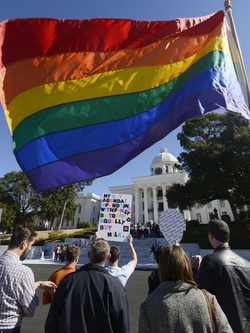
MONTGOMERY, Ala. — The Alabama House of Representatives on Thursday passed legislationthat would prevent those empowered to officiate weddings from being forced to conduct ceremonies to which they have religious objections, or to be sued over their refusal.
Although the bill does not directly address same-sex marriage, opponents said the legislation targeted gay and lesbian couples and could allow religiously affiliated organizations, such as hospitals, to deny benefits and services to same-sex couples.
"We're here because we want to condemn a population we don't understand and we don't like," said Rep. Patricia Todd, a Democrat from Birmingham, Ala., the only openly gay member of the Alabama Legislature. "It doesn't change anything, but it will help (lawmakers) in districts show they will stand up against same sex-sex marriage."
USA TODAY
Groups seek statewide order on gay marriage in Ala.
Rep. Jim Hill, a Republican from Springville, Ala., a former judge and the sponsor of the bill, insisted that the bill, introduced amid a statewide controversy over the legality of same-sex marriage, was not about same-sex marriage.
"I received several phone calls from constituents in St. Clair County, primarily ministers and judges who asked me whether the mere fact an individual is authorized to perform a marriage ceremony (means) are they compelled to perform a marriage ceremony," he said in introducing the bill.
The legislation says "no church, synagogue, society or religious organization" can be sued over a refusal to provide accommodations or services "related to the recognitions, solemnization or celebration of a marriage."
Both Hill and critics said that current law does not force ministers to conduct marriages they oppose. That language, say opponents, could allow religiously affiliated organizations like hospitals to deny services to same-sex couples, such as visitation rights.
USA TODAY
Alabama's stand against gay marriage crumbles
Rep. Christopher England, a Democrat from Tuscaloosa, Ala., said the religious organization definition could extend to employees of that organization and lead to a host of denials. During the debate, England asked Hill whether he would accept an amendment focusing specifically on religious beliefs.
"If this bill focuses on a person's right to say no due to religious beliefs, then how come we can't amend out 'religious organizations' and 'recognition?' " he asked.
Hill said "I don't want to do that," but declined to elaborate on his reasons.
As has been the case early in the 2015 session, supporters of the House legislation said very little. Rep. Mike Ball, a Republican from Huntsville, Ala., said he believed the debate was making "a mountain out of a molehill" and that the bill would not be disruptive.
Todd said the bill would lead to lawsuits, and said she would continue to fight it.
"I know you're going to go back home and say, 'Look what we did to those gay people,' " she said. "Well, you didn't do anything."
U.S. judge rules Nebraska same-sex marriage ban unconstitutional
03/03/15
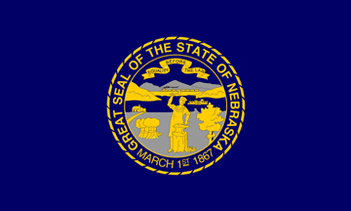
(Reuters) - A federal judge on Monday ruled Nebraska's ban on gay marriage unconstitutional in a decision that could allow same-sex couples to marry in the state within a week.
U.S. District Judge Joseph Bataillon issued a preliminary injunction in the case brought by seven same-sex couples in the state, calling Nebraska's ban an "unabashedly gender-specific infringement of the equal rights of its citizens."
Bataillon denied a state request to stay his decision but said his injunction would take effect on March 9 to assuage Nebraska officials' concerns of possible administrative turmoil.
Nebraska state officials quickly appealed the ruling to the 8th Circuit U.S. Court of Appeals.
"The definition of marriage is an issue for the people of Nebraska, and an activist judge should not substitute his personal political preferences for the will of the people," Governor Pete Ricketts said in a statement.
Nebraska voters in 2000 adopted a state constitutional amendment that defines marriage as only between one man and one woman and does not recognize civil unions, domestic partnerships or similar relationships for same-sex couples.
The plaintiffs include Sally Waters, who has stage four breast cancer that has spread and wants Nebraska to recognize her 2008 marriage to Susan Waters in California in part to provide critical financial protections for their children.
"Today is a day for celebration. The love and commitment our clients share will finally be entitled to equality and respect in the eyes of the law," said Danielle Conrad, executive director for the American Civil Liberties Union of Nebraska.
The ACLU and other attorneys brought the challenge against the ban in November.
Nebraska officials had asked the judge to put the challenge on hold while the U.S. Supreme Court decides whether states can ban gay marriage, arguing that the Nebraska case raises the same questions the Supreme Court will address.
Challengers to bans in Michigan, Ohio, Tennessee and Kentucky filed briefs on Friday in the U.S. Supreme Court case, which is expected to be decided by the end of June.
"It is time for the U.S. Supreme Court to bring the country to national resolution and end marriage discrimination for all Americans," Freedom to Marry president Evan Wolfson said in a statement.
(Reporting by Carson Vaughan in Nebraska and David Bailey in Minneapolis; Editing bySusan Heavey, Bill Trott and Meredith Mazzilli)
U.S. District Judge Joseph Bataillon issued a preliminary injunction in the case brought by seven same-sex couples in the state, calling Nebraska's ban an "unabashedly gender-specific infringement of the equal rights of its citizens."
Bataillon denied a state request to stay his decision but said his injunction would take effect on March 9 to assuage Nebraska officials' concerns of possible administrative turmoil.
Nebraska state officials quickly appealed the ruling to the 8th Circuit U.S. Court of Appeals.
"The definition of marriage is an issue for the people of Nebraska, and an activist judge should not substitute his personal political preferences for the will of the people," Governor Pete Ricketts said in a statement.
Nebraska voters in 2000 adopted a state constitutional amendment that defines marriage as only between one man and one woman and does not recognize civil unions, domestic partnerships or similar relationships for same-sex couples.
The plaintiffs include Sally Waters, who has stage four breast cancer that has spread and wants Nebraska to recognize her 2008 marriage to Susan Waters in California in part to provide critical financial protections for their children.
"Today is a day for celebration. The love and commitment our clients share will finally be entitled to equality and respect in the eyes of the law," said Danielle Conrad, executive director for the American Civil Liberties Union of Nebraska.
The ACLU and other attorneys brought the challenge against the ban in November.
Nebraska officials had asked the judge to put the challenge on hold while the U.S. Supreme Court decides whether states can ban gay marriage, arguing that the Nebraska case raises the same questions the Supreme Court will address.
Challengers to bans in Michigan, Ohio, Tennessee and Kentucky filed briefs on Friday in the U.S. Supreme Court case, which is expected to be decided by the end of June.
"It is time for the U.S. Supreme Court to bring the country to national resolution and end marriage discrimination for all Americans," Freedom to Marry president Evan Wolfson said in a statement.
(Reporting by Carson Vaughan in Nebraska and David Bailey in Minneapolis; Editing bySusan Heavey, Bill Trott and Meredith Mazzilli)
Texas conservatives hold controversial cake-cutting over gay marriage ban
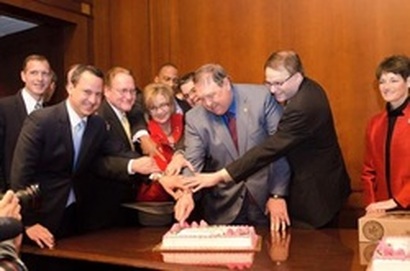
Texas lawmakers joined conservative leaders at the Capitol for a controversial slice of symbolic wedding cake yesterday, in a 10th anniversary celebration of a constitutional amendment that defined Texas marriages as "the union of one man and one woman."
A Facebook post by conservative group Texas Values, announcing the celebration, drew hundreds of comments both praising and trashing the officials' symbolic ceremony.
"My home state's religious bigotry and god-approved hatred for their fellow man deeply saddens me," sad one Facebook commenter." It does you no harm when 2 people fall in love, regardless of their gender. You should spend more of your time cultivating love rather than hatred, nothing would better the world we ALL share more."
Texas is one of 13 U.S. states which only allow couples of opposite sexes to marry, even though last week two women were wed in Austin. Cutting yesterday's cake was State Rep. Cecil Bell, who proposed legislation that would withhold pay from government employees who conspire in the issuance of a same-sex marriage license,reported the Austin American-Statesman.
A Facebook post by conservative group Texas Values, announcing the celebration, drew hundreds of comments both praising and trashing the officials' symbolic ceremony.
"My home state's religious bigotry and god-approved hatred for their fellow man deeply saddens me," sad one Facebook commenter." It does you no harm when 2 people fall in love, regardless of their gender. You should spend more of your time cultivating love rather than hatred, nothing would better the world we ALL share more."
Texas is one of 13 U.S. states which only allow couples of opposite sexes to marry, even though last week two women were wed in Austin. Cutting yesterday's cake was State Rep. Cecil Bell, who proposed legislation that would withhold pay from government employees who conspire in the issuance of a same-sex marriage license,reported the Austin American-Statesman.
That anti-gay bill in Arkansas actually became law today.
Why couldn’t activists stop it?
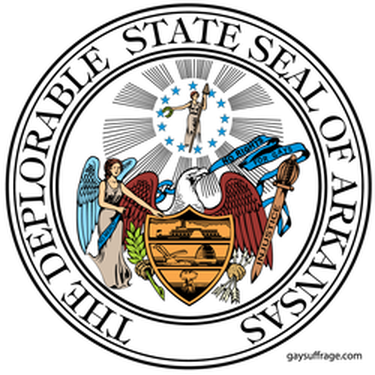
Monday was the deadline for Arkansas Gov. Asa Hutchinson to veto SB 202, the anti-anti-discrimination bill that seeks to prevent cities and counties from protecting the civil rights of gay people.
The bill passed the legislature 10 days ago. Hutchinson said he would allow it to become law. During the past week, pressure had been mounting on the governor to change his mind.
Five days ago, the Arkansas chapter of the Human Rights Campaign released a statement condemning the bill. “Discrimination is not an Arkansas value, and the Governor should take swift, immediate action to veto SB202,” said chapter director Kendra R. Johnson.
On Saturday, national groups like the American Civil Liberties Union, Lambda Legal, and the National Center for Lesbian Rights joined in asking Hutchinson to veto it.
“There is nothing but discriminatory intent here,” the groups’ press release reads. “And no valid public interest can possibly be served by allowing private businesses to discriminate based on sexual orientation, gender identity or other characteristics that might be covered by local ordinances.”
Finally on Sunday night, musician and gay icon Cher weighed in on the bill, accusing the governor of “hanging the LBGT community out to dry”:
The bill passed the legislature 10 days ago. Hutchinson said he would allow it to become law. During the past week, pressure had been mounting on the governor to change his mind.
Five days ago, the Arkansas chapter of the Human Rights Campaign released a statement condemning the bill. “Discrimination is not an Arkansas value, and the Governor should take swift, immediate action to veto SB202,” said chapter director Kendra R. Johnson.
On Saturday, national groups like the American Civil Liberties Union, Lambda Legal, and the National Center for Lesbian Rights joined in asking Hutchinson to veto it.
“There is nothing but discriminatory intent here,” the groups’ press release reads. “And no valid public interest can possibly be served by allowing private businesses to discriminate based on sexual orientation, gender identity or other characteristics that might be covered by local ordinances.”
Finally on Sunday night, musician and gay icon Cher weighed in on the bill, accusing the governor of “hanging the LBGT community out to dry”:
Mobile probate judge won't approve adoption in gay marriage case; plaintiffs file new suit
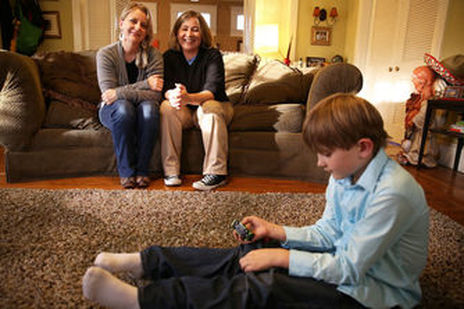
By Randy Uehara Mistrot
Less than two weeks after a federal judge ordered him to comply with her ruling legalizing same-sex marriage, Mobile County's probate judge has indicated he will not process a couple's adoption petition until after the Supreme Court decides another case.
That has put Cari Searcy's second-parent adoption in legal limbo and prompted her lawyers to filed a new lawsuit Tuesday in federal court asking for an order prohibiting Probate Judge Don Davis from "directly or indirectly" enforcing the state's same-sex marriage ban that the federal judge struck down last month.
It was Searcy's inability to adopt the boy that she and spouse Kim McKeand have raised since birth that prompted them to challenge Alabama's ban on same-sex marriage.
David Kennedy, one of the couple's lawyers, expressed exasperation at Davis' decision. He noted that the U.S. Supreme Court allowed U.S. District Judge Callie V.S. "Ginny" Granade's order to take effect and that Granade handed down a separate order on Feb. 13 specifically instructing Davis to stop enforcing the gay marriage ban.
"I'm disappointed. The United States Supreme Court made a decision with the ruling in the Searcy case," he said. "We don't think that it's fair or equitable to Cari Searcy to wait until the Supreme Court has ruled on some 6th Circuit (U.S. Court of Appeals) case."
Davis declined through a spokeswoman to comment, citing pending litigation. His private attorneys did not immediately return calls seeking comment.
On Friday, Davis issued an "interlocutory decree" granting Searcy temporary parental rights, including the authority to consent to necessary medical treatment. Such temporary orders are standard in second-parent adoptions until the court can convene a hearing to review any potential objection to a permanent adoption.
Those final hearings typically last about 15 minutes, according to lawyers familiar with those proceedings.
But Davis included a paragraph stating, "It is further ORDERED by the Court that this Decree is qualified in nature, and the Court will not issue a final adoption order until a final ruling is issued in the United States Supreme Court on the Marriage Act cases before it."
In addition to the court order instructing Davis to grant the adoption without further delay, the lawsuit also asks for compensatory and - if the judge deems it appropriate - punitive damages, as well as legal fees.
A friend from Florida agreed to become a sperm donor, and McKeand gave birth to her son on Dec. 30, 2005. The father waived his parental rights, and McKeand and Searcy have raised the child ever since.
Searcy has been a "legal stranger," though, because Alabama law did not recognize her 2008 marriage to McKeand. Davis cited Alabama's same-sex marriage ban in rejecting Searcy's second-parent adoption, and a state appeals court later upheld the decision. So McKenad and Searcy sued last year.
But with Granade's Jan. 23 ruling, the plaintiffs' attorneys argue, Davis is obligated to treat the adoption petition as he would from a heterosexual married couple.
"There is no articulable reason why Searcy is not allowed to adopt (the child) other than the fact that she is a woman married to another woman. ... There can be no legitimate question on the issue, and Hon. Don Davis has no legitimate reason for continuing to abide by the fiction that the Alabama Sanctity Laws have any effect in Alabama," the suit states.
Kennedy said the temporary order issued by Davis offers Searcy some protection but does not necessary guarantee that she would get custody if McKeand were to die suddenly between now and the time the high court is expect to settle the same-sex marriage question once and for all sometime this summer. Any number of relatives could challenge Searcy for custody and she could at the very least have to fight in court, Kennedy said.
"That's actually very much an open question," he said. "It's the reason we filed the (original) lawsuit."
Less than two weeks after a federal judge ordered him to comply with her ruling legalizing same-sex marriage, Mobile County's probate judge has indicated he will not process a couple's adoption petition until after the Supreme Court decides another case.
That has put Cari Searcy's second-parent adoption in legal limbo and prompted her lawyers to filed a new lawsuit Tuesday in federal court asking for an order prohibiting Probate Judge Don Davis from "directly or indirectly" enforcing the state's same-sex marriage ban that the federal judge struck down last month.
It was Searcy's inability to adopt the boy that she and spouse Kim McKeand have raised since birth that prompted them to challenge Alabama's ban on same-sex marriage.
David Kennedy, one of the couple's lawyers, expressed exasperation at Davis' decision. He noted that the U.S. Supreme Court allowed U.S. District Judge Callie V.S. "Ginny" Granade's order to take effect and that Granade handed down a separate order on Feb. 13 specifically instructing Davis to stop enforcing the gay marriage ban.
"I'm disappointed. The United States Supreme Court made a decision with the ruling in the Searcy case," he said. "We don't think that it's fair or equitable to Cari Searcy to wait until the Supreme Court has ruled on some 6th Circuit (U.S. Court of Appeals) case."
Davis declined through a spokeswoman to comment, citing pending litigation. His private attorneys did not immediately return calls seeking comment.
On Friday, Davis issued an "interlocutory decree" granting Searcy temporary parental rights, including the authority to consent to necessary medical treatment. Such temporary orders are standard in second-parent adoptions until the court can convene a hearing to review any potential objection to a permanent adoption.
Those final hearings typically last about 15 minutes, according to lawyers familiar with those proceedings.
But Davis included a paragraph stating, "It is further ORDERED by the Court that this Decree is qualified in nature, and the Court will not issue a final adoption order until a final ruling is issued in the United States Supreme Court on the Marriage Act cases before it."
In addition to the court order instructing Davis to grant the adoption without further delay, the lawsuit also asks for compensatory and - if the judge deems it appropriate - punitive damages, as well as legal fees.
A friend from Florida agreed to become a sperm donor, and McKeand gave birth to her son on Dec. 30, 2005. The father waived his parental rights, and McKeand and Searcy have raised the child ever since.
Searcy has been a "legal stranger," though, because Alabama law did not recognize her 2008 marriage to McKeand. Davis cited Alabama's same-sex marriage ban in rejecting Searcy's second-parent adoption, and a state appeals court later upheld the decision. So McKenad and Searcy sued last year.
But with Granade's Jan. 23 ruling, the plaintiffs' attorneys argue, Davis is obligated to treat the adoption petition as he would from a heterosexual married couple.
"There is no articulable reason why Searcy is not allowed to adopt (the child) other than the fact that she is a woman married to another woman. ... There can be no legitimate question on the issue, and Hon. Don Davis has no legitimate reason for continuing to abide by the fiction that the Alabama Sanctity Laws have any effect in Alabama," the suit states.
Kennedy said the temporary order issued by Davis offers Searcy some protection but does not necessary guarantee that she would get custody if McKeand were to die suddenly between now and the time the high court is expect to settle the same-sex marriage question once and for all sometime this summer. Any number of relatives could challenge Searcy for custody and she could at the very least have to fight in court, Kennedy said.
"That's actually very much an open question," he said. "It's the reason we filed the (original) lawsuit."
Gov. Bobby Jindal meets the press — and it doesn't go well
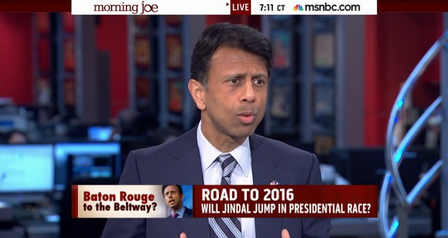
When you’re running for president, you have to do a lot of things you’d rather not do. Tops on that list if you’re Bobby Jindal is talking to the press, something he’s been loath to do during his seven-plus years as Louisiana’s governor. Because Jindal is officially contemplating a run for president next year (in truth, he can’t wait to run), he met a room of skeptical reporters at a Washington, D.C., breakfast earlier this week to start rolling out his policy bona fides.
By all accounts, it did not go well.
The Jindal who met the press this week was actually the latest iteration of our governor, who in recent weeks has reverted to his old policy wonk shtick. Among other things, he talked at length about education, bolstered by a new report from his nonprofit policy group America Next. It was a change from two of Jindal’s recent incarnations: the foreign policy upstart decrying “no-go zones” in Europe and offering his thoughts on Cuba; and “Bubba” Jindal, pal to the Duck Dynasty Robertson clan, tweeting photos of himself shooting a gun; sending Christmas cards featuring him in full camouflage; and wearing an oversized cowboy belt buckle at a prayer rally. Clearly, Jindal is a political chameleon who will say or do anything to blend in with whatever constituency he’s wooing.
But even the ever-calculating Jindal couldn’t foresee the disastrous run-up to his D.C. media breakfast. In the wake of his trip to Europe — and his “no-go zones” debacle — several profiles of Jindal appeared in the national press. All were highly critical.
Jindal’s staffers could easily dismiss The New York Times’ piece as just another example of “leftist bias,” but not so a story in The American Conservative titled, “How Bobby Jindal Wrecked Louisiana.” The latter was written by Rod Dreher, a Louisiana native and prolific political writer who once supported Jindal. “I keep telling my friends in the national media that if you think Bobby Jindal has a chance in hell of becoming president,” Dreher wrote, “send a reporter down to spend a few days in Louisiana, seeing what condition he’s leaving his state in.” Most of what Dreher reported (fiscal disasters in higher education and health care) wasn’t news to Louisianans, but it was an eye-opener to the national conservative audience Jindal is courting. It certainly couldn’t be written off as a leftist screed.
Then there was Tyler Bridges’ profile of Jindal in Politico, which noted Jindal’s two Achilles heels. First, he inherited a nearly $1 billion surplus from his predecessor, Gov. Kathleen Blanco, and turned it into a $1.6 billion (and growing) deficit. Second, Louisiana’s unemployment numbers have nearly doubled under Jindal, in contrast to the national trend under President Barack Obama, whose leadership he enjoys criticizing.
All this was a prelude to Jindal’s press breakfast, which was not exactly a PR triumph. The Washington Post’s Dana Milbank began his report by saying, “Louisiana Gov. Bobby Jindal took his presidential campaign-in-waiting to Washington on Monday trailed by an unwelcome, unsavory and downright unpleasant companion: his record.” That record, of course, was the one thing Jindal didn’t want to discuss with the national press. He mostly talked about his “new” education plan, which was a rehash of cliches that Louisianans had heard before: “parent choice” (diverting taxpayer funds to private schools); bashing Common Core (which Jindal once championed); and busting teachers’ unions (which he calls “setting teachers free”). According to Milbank, the first question came from The Christian Science Monitor, which hosted Jindal: “Is there some irony in your talking about ramping up education while you’re cutting it in Louisiana?”
Even the normally welcoming Morning Joe program on MSNBC proved a minefield. Host Joe Scarborough zeroed in on Jindal’s Common Core flip-flop (“How did that happen?”) and asked specifically about LSU’s potential 90 percent tuition hike in the face of Louisiana’s budget crisis. Jindal dodged the question, saying LSU has “one of the lowest tuition rates in the entire country.” When asked how much it costs to attend LSU, the governor said it cost “less than $10,000” a year for tuition, books, meals and housing. It actually costs more like $20,000.
By all accounts, it did not go well.
The Jindal who met the press this week was actually the latest iteration of our governor, who in recent weeks has reverted to his old policy wonk shtick. Among other things, he talked at length about education, bolstered by a new report from his nonprofit policy group America Next. It was a change from two of Jindal’s recent incarnations: the foreign policy upstart decrying “no-go zones” in Europe and offering his thoughts on Cuba; and “Bubba” Jindal, pal to the Duck Dynasty Robertson clan, tweeting photos of himself shooting a gun; sending Christmas cards featuring him in full camouflage; and wearing an oversized cowboy belt buckle at a prayer rally. Clearly, Jindal is a political chameleon who will say or do anything to blend in with whatever constituency he’s wooing.
But even the ever-calculating Jindal couldn’t foresee the disastrous run-up to his D.C. media breakfast. In the wake of his trip to Europe — and his “no-go zones” debacle — several profiles of Jindal appeared in the national press. All were highly critical.
Jindal’s staffers could easily dismiss The New York Times’ piece as just another example of “leftist bias,” but not so a story in The American Conservative titled, “How Bobby Jindal Wrecked Louisiana.” The latter was written by Rod Dreher, a Louisiana native and prolific political writer who once supported Jindal. “I keep telling my friends in the national media that if you think Bobby Jindal has a chance in hell of becoming president,” Dreher wrote, “send a reporter down to spend a few days in Louisiana, seeing what condition he’s leaving his state in.” Most of what Dreher reported (fiscal disasters in higher education and health care) wasn’t news to Louisianans, but it was an eye-opener to the national conservative audience Jindal is courting. It certainly couldn’t be written off as a leftist screed.
Then there was Tyler Bridges’ profile of Jindal in Politico, which noted Jindal’s two Achilles heels. First, he inherited a nearly $1 billion surplus from his predecessor, Gov. Kathleen Blanco, and turned it into a $1.6 billion (and growing) deficit. Second, Louisiana’s unemployment numbers have nearly doubled under Jindal, in contrast to the national trend under President Barack Obama, whose leadership he enjoys criticizing.
All this was a prelude to Jindal’s press breakfast, which was not exactly a PR triumph. The Washington Post’s Dana Milbank began his report by saying, “Louisiana Gov. Bobby Jindal took his presidential campaign-in-waiting to Washington on Monday trailed by an unwelcome, unsavory and downright unpleasant companion: his record.” That record, of course, was the one thing Jindal didn’t want to discuss with the national press. He mostly talked about his “new” education plan, which was a rehash of cliches that Louisianans had heard before: “parent choice” (diverting taxpayer funds to private schools); bashing Common Core (which Jindal once championed); and busting teachers’ unions (which he calls “setting teachers free”). According to Milbank, the first question came from The Christian Science Monitor, which hosted Jindal: “Is there some irony in your talking about ramping up education while you’re cutting it in Louisiana?”
Even the normally welcoming Morning Joe program on MSNBC proved a minefield. Host Joe Scarborough zeroed in on Jindal’s Common Core flip-flop (“How did that happen?”) and asked specifically about LSU’s potential 90 percent tuition hike in the face of Louisiana’s budget crisis. Jindal dodged the question, saying LSU has “one of the lowest tuition rates in the entire country.” When asked how much it costs to attend LSU, the governor said it cost “less than $10,000” a year for tuition, books, meals and housing. It actually costs more like $20,000.
Same-sex marriage supporters rally at Capitol after ruling
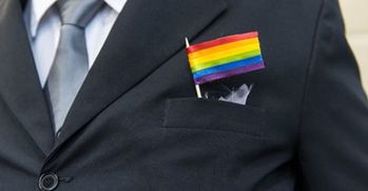
AUSTIN – A Travis County judge ruled Tuesday parts of the Texas' ban on same-sex marriage is unconstitutional.
In the order Judge Guy Herman said parts of the state's family code and state constitution, "...are unconstitutional insofar as they restrict marriage in the state of Texas to a union of a man and woman... because such restrictions and prohibitions violate the Due Process Clause and the Equal Protection Clause of the Fourteenth Amendment to the Unites States Constitution."
Dozens of religious leaders and supporters of same-sex marriage gathered outside the capitol Tuesday, saying it is an issue of equality and love.
"There's nothing to fear, and everything to gain, by treating all our citizens with dignity, respect, and justice under the law," said Eric Folkerth, a pastor at Northaven United Methodist Church in Dallas.
"We are prepared to continue this refrain until love wins the day and marriage equality is the law of the land in this state and every state," said Minister Leslie Jackson of United Church of Christ.
Diana Finfrock Farrar and Charlotte Moellering of Dallas were also attended the event. The two married in Canada four years ago, a union that is not legally recognized by the state.
"I'm not sure that everyone is accepting, maybe the laws are changing but the hearts and minds are a little slow to catch up," said Moellering.
According to 2010 Census data, 5 out of every 1,000 Texas households have a same-sex couple living together. Travis County has the highest amount, with 11 per 1,000 households.
More than 35 states currently allow same-sex marriage. Texas is not one of them, voting in 2005 to declare marriage as between a man and a woman.
While those who gathered Tuesday want to see that change, others are strongly opposed to the idea.
"They're attacking marriage, they want to redefine marriage, and they want to force their will on the state and the people after the people have already spoken on this issue," said Jonathan Saenz, president of Texas Values.
Travis County clerk Dana DeBeauvior says her office is not issuing marriage licenses to same-sex couples because the judge's ruling did not include an order to do so.
According to our partners at the Austin American-Statesman, Attorney General Ken Paxton cannot appeal the case.
In the order Judge Guy Herman said parts of the state's family code and state constitution, "...are unconstitutional insofar as they restrict marriage in the state of Texas to a union of a man and woman... because such restrictions and prohibitions violate the Due Process Clause and the Equal Protection Clause of the Fourteenth Amendment to the Unites States Constitution."
Dozens of religious leaders and supporters of same-sex marriage gathered outside the capitol Tuesday, saying it is an issue of equality and love.
"There's nothing to fear, and everything to gain, by treating all our citizens with dignity, respect, and justice under the law," said Eric Folkerth, a pastor at Northaven United Methodist Church in Dallas.
"We are prepared to continue this refrain until love wins the day and marriage equality is the law of the land in this state and every state," said Minister Leslie Jackson of United Church of Christ.
Diana Finfrock Farrar and Charlotte Moellering of Dallas were also attended the event. The two married in Canada four years ago, a union that is not legally recognized by the state.
"I'm not sure that everyone is accepting, maybe the laws are changing but the hearts and minds are a little slow to catch up," said Moellering.
According to 2010 Census data, 5 out of every 1,000 Texas households have a same-sex couple living together. Travis County has the highest amount, with 11 per 1,000 households.
More than 35 states currently allow same-sex marriage. Texas is not one of them, voting in 2005 to declare marriage as between a man and a woman.
While those who gathered Tuesday want to see that change, others are strongly opposed to the idea.
"They're attacking marriage, they want to redefine marriage, and they want to force their will on the state and the people after the people have already spoken on this issue," said Jonathan Saenz, president of Texas Values.
Travis County clerk Dana DeBeauvior says her office is not issuing marriage licenses to same-sex couples because the judge's ruling did not include an order to do so.
According to our partners at the Austin American-Statesman, Attorney General Ken Paxton cannot appeal the case.
Louisiana throwing the LGBT community out of the nest!
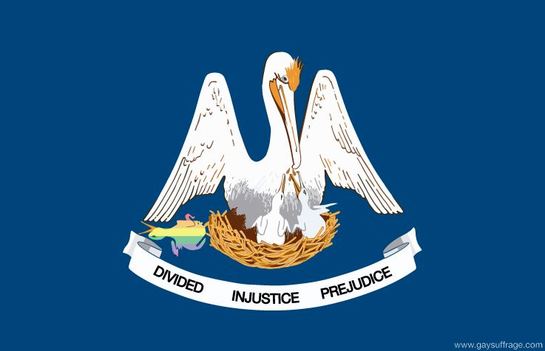
Supreme Court won't hear Louisiana gay marriage case
The Supreme Court denied a plea from gay and lesbian couples in Louisiana on Monday that it consider striking down the state's ban against same-sex marriage.
The decision means that a district court ruling upholding the ban there first must be challenged in a federal appeals court, where it was argued Friday along with cases from Texas and Mississippi.
Four other cases from Michigan, Ohio, Kentucky and Tennessee remain pending at the high court, however. The justices could accept one or more of those cases for argument later this week.
The Supreme Court denied a plea from gay and lesbian couples in Louisiana on Monday that it consider striking down the state's ban against same-sex marriage.
The decision means that a district court ruling upholding the ban there first must be challenged in a federal appeals court, where it was argued Friday along with cases from Texas and Mississippi.
Four other cases from Michigan, Ohio, Kentucky and Tennessee remain pending at the high court, however. The justices could accept one or more of those cases for argument later this week.
Alabama justice vows to defy U.S. Supreme Court if it backs gay marriage
By Will Dunham / Reuters
WASHINGTON — Roy Moore, the conservative chief justice of Alabama’s Supreme Court, said Sunday that if the U.S. Supreme Court decides that same-sex couples have a constitutional right to marry, he would defy the ruling because it would alter God’s “organic law.”
Under Justice Moore’s urging, many Alabama counties defied both a federal judge’s ruling throwing out the state’s gay marriage ban and the U.S. Supreme Court’s refusal to delay the beginning of same-sex marriages last Monday.
The U.S. Supreme Court will hear April arguments on whether state gay marriage bans violate the Constitution’s guarantee of equal treatment under the law. A ruling is expected in June.
“This power over marriage, which came from God under our organic law, is not to be redefined by the United States Supreme Court or any federal court,” Justice Moore told “Fox News Sunday.”
U.S. Supreme Court rulings are considered the last word on American law.
Asked about the Supreme Court possibly backing same-sex marriage, Justice Moore said: “They may do it, but they may do it wrongfully just like they did in” two 19th century rulings: the pro-slavery 1857 Dred Scott decision and the 1896 Plessy v. Ferguson ruling backing racial segregation.
“I would not be bound thereby” if the Supreme Court declares a right to gay marriage, Justice Moore said.
“I could recuse or dissent, as a justice from Delaware did in the Dred Scott case in 1857. They ruled black people were property. Should a court today obey such a ruling that is completely contradictory to the Constitution?” Justice Moore said.
Justice Moore said Alabama probate judges who have heeded U.S. District Court Judge Callie Granade’s ruling throwing out the state’s same-sex marriage ban are “breaking the Alabama constitution sanctity-of-marriage amendment, which has not been overturned by the United States Supreme Court.”
“We’ve got this federal intrusion into state sovereignty … occurring right under our nose and nobody is standing up,” Justice Moore said. “Twenty-one states have bowed down to federal court orders when they didn’t have to,” he added, referring to states where gay marriage has gone into effect after federal court rulings.
“We’ve got to understand that what a judge says is not law,” Justice Moore added.
In 2000, Justice Moore gained national attention for installing a monument to the biblical Ten Commandments in the state’s judicial building despite the U.S. Constitution’s requirement for a separation of church and state. He was removed from office three years later after defying a federal order to take it down, but was returned to his post by voters in 2012.
WASHINGTON — Roy Moore, the conservative chief justice of Alabama’s Supreme Court, said Sunday that if the U.S. Supreme Court decides that same-sex couples have a constitutional right to marry, he would defy the ruling because it would alter God’s “organic law.”
Under Justice Moore’s urging, many Alabama counties defied both a federal judge’s ruling throwing out the state’s gay marriage ban and the U.S. Supreme Court’s refusal to delay the beginning of same-sex marriages last Monday.
The U.S. Supreme Court will hear April arguments on whether state gay marriage bans violate the Constitution’s guarantee of equal treatment under the law. A ruling is expected in June.
“This power over marriage, which came from God under our organic law, is not to be redefined by the United States Supreme Court or any federal court,” Justice Moore told “Fox News Sunday.”
U.S. Supreme Court rulings are considered the last word on American law.
Asked about the Supreme Court possibly backing same-sex marriage, Justice Moore said: “They may do it, but they may do it wrongfully just like they did in” two 19th century rulings: the pro-slavery 1857 Dred Scott decision and the 1896 Plessy v. Ferguson ruling backing racial segregation.
“I would not be bound thereby” if the Supreme Court declares a right to gay marriage, Justice Moore said.
“I could recuse or dissent, as a justice from Delaware did in the Dred Scott case in 1857. They ruled black people were property. Should a court today obey such a ruling that is completely contradictory to the Constitution?” Justice Moore said.
Justice Moore said Alabama probate judges who have heeded U.S. District Court Judge Callie Granade’s ruling throwing out the state’s same-sex marriage ban are “breaking the Alabama constitution sanctity-of-marriage amendment, which has not been overturned by the United States Supreme Court.”
“We’ve got this federal intrusion into state sovereignty … occurring right under our nose and nobody is standing up,” Justice Moore said. “Twenty-one states have bowed down to federal court orders when they didn’t have to,” he added, referring to states where gay marriage has gone into effect after federal court rulings.
“We’ve got to understand that what a judge says is not law,” Justice Moore added.
In 2000, Justice Moore gained national attention for installing a monument to the biblical Ten Commandments in the state’s judicial building despite the U.S. Constitution’s requirement for a separation of church and state. He was removed from office three years later after defying a federal order to take it down, but was returned to his post by voters in 2012.
Arkansas House Votes In Favor Of LGBT Discrimination
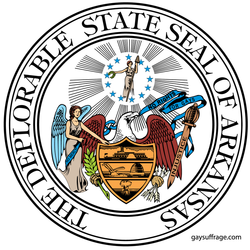
On Friday, the Arkansas House of Representatives voted 57-20 in favor of a bill that would bar cities and counties from sanctioning LGBT anti-discrimination laws.
Arkansas state Sen. Bart Hester (R), who sponsored the bill, that creating uniform policies across the state will attract businesses and that he was angered by one city’s repeated attempts to expand rights for lesbian, gay, bisexual and transgender individuals.
“There are many things necessary for stability -- and civil rights need to not be a volatile situation,” he said.
Arkansas state Sen. Bart Hester (R), who sponsored the bill, that creating uniform policies across the state will attract businesses and that he was angered by one city’s repeated attempts to expand rights for lesbian, gay, bisexual and transgender individuals.
“There are many things necessary for stability -- and civil rights need to not be a volatile situation,” he said.
Mississippi Pastor Edward James Protests Gay Marriage With Horse In Wedding Dress
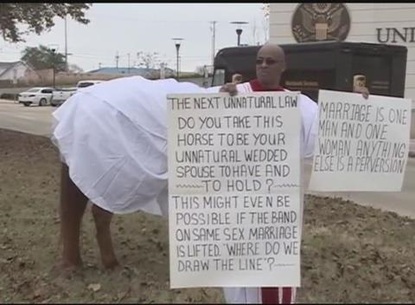
By Emily Le Coz
(Reuters) - A Mississippi pastor brought a horse in a wedding dress to stand with him outside a federal courthouse on Friday in Jackson to protest a federal judge's ruling, currently on hold, to overturn the socially conservative state's ban on gay marriage.
The horse, complete with white flowers tucked into its harness and a bouquet at its feet, munched grass as the pastor, Edward James of Bertha Chapel Missionary Baptist Church, spoke and waved signs at passersby.
"Do you take this horse to be your unnatural wedded spouse to have and to hold?" one sign read.
U.S. District Judge Carlton Reeves struck down Mississippi's same-sex marriage ban in a ruling last month. Gay couples cannot yet marry in Mississippi pending the outcome of a state appeal to the 5th U.S. Circuit Court of Appeals in New Orleans, which is hearing arguments in the case on Jan. 9.
Gay marriage is legal in 35 U.S. states, a trend that has accelerated since the Supreme Court ruled in June 2013 that legally married same-sex couples nationwide are eligible for federal benefits, striking down a key part of the 1996 federal Defense of Marriage Act.
While gay marriage advocates have enjoyed the upper hand in the courts since then, the Cincinnati-based 6th Circuit U.S. Court of Appeals in November became the first to rule the other way in upholding state bans on same-sex marriage.
That decision was seen as setting the stage for the Supreme Court to finally rule on the merits of gay marriage nationwide.
Mississippi is home to an estimated 3,484 same-sex couples, according to the most recent decennial census. About one quarter of the couples are raising children.
Speaking in a video-taped interview with the Clarion-Ledger newspaper, James acknowledged that his horse bride was absurd, but said the spectacle served a point.
"Although it's ridiculous, so is the same-sex marriage status," he said.
(Reporting by Emily Le Coz in Mississippi; Editing by Jonathan Kaminsky and Ken Wills)
(Reuters) - A Mississippi pastor brought a horse in a wedding dress to stand with him outside a federal courthouse on Friday in Jackson to protest a federal judge's ruling, currently on hold, to overturn the socially conservative state's ban on gay marriage.
The horse, complete with white flowers tucked into its harness and a bouquet at its feet, munched grass as the pastor, Edward James of Bertha Chapel Missionary Baptist Church, spoke and waved signs at passersby.
"Do you take this horse to be your unnatural wedded spouse to have and to hold?" one sign read.
U.S. District Judge Carlton Reeves struck down Mississippi's same-sex marriage ban in a ruling last month. Gay couples cannot yet marry in Mississippi pending the outcome of a state appeal to the 5th U.S. Circuit Court of Appeals in New Orleans, which is hearing arguments in the case on Jan. 9.
Gay marriage is legal in 35 U.S. states, a trend that has accelerated since the Supreme Court ruled in June 2013 that legally married same-sex couples nationwide are eligible for federal benefits, striking down a key part of the 1996 federal Defense of Marriage Act.
While gay marriage advocates have enjoyed the upper hand in the courts since then, the Cincinnati-based 6th Circuit U.S. Court of Appeals in November became the first to rule the other way in upholding state bans on same-sex marriage.
That decision was seen as setting the stage for the Supreme Court to finally rule on the merits of gay marriage nationwide.
Mississippi is home to an estimated 3,484 same-sex couples, according to the most recent decennial census. About one quarter of the couples are raising children.
Speaking in a video-taped interview with the Clarion-Ledger newspaper, James acknowledged that his horse bride was absurd, but said the spectacle served a point.
"Although it's ridiculous, so is the same-sex marriage status," he said.
(Reporting by Emily Le Coz in Mississippi; Editing by Jonathan Kaminsky and Ken Wills)
Judge rules that gay marriage ban in Missouri is unconstitutional
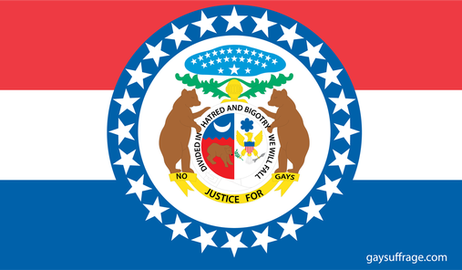
A Missouri judge has overturned the state's ban on same-sex marriages and ordered registrars to start issuing licenses to gay and lesbian couples.
In a ruling Wednesday, Judge Rex Burlison struck down the ban, declaring it unconstitutional and saying officials should give licenses to same-sex couples seeking to get married.
"Any same-sex couple that satisfies all the requirements for marriage under Missouri law, other than being of different sexes, is legally entitled to a marriage license," wrote Burlison, a St. Louis circuit judge.
Shortly after the ruling, couples marched to St. Louis City Hall to apply for licenses, CNN affiliate KSDKreported.
The ruling follows an incident in June, when St. Louis issued marriage licenses to four same-sex couples. The state attorney general sued to stop it, arguing it defies Missouri's 2004 constitutional amendment banning gay marriage.
St. Louis Mayor Francis Slay said times have changed, and the ban was long overdue.
"When you have two people who love each other and want to commit to each other through marriage, I can't think of anything more beautiful," he said. "Whether you are heterosexual, it shouldn't matter. We are all people under the law, and we should all be treated equally."
Slay said his brother, who is gay, just married his partner in New York.
"They could not get married in St. Louis," he told the affiliate. "Based on what is happening here, he may move back to St. Louis."
But the state's top prosecutor said he has appealed the ruling to the Missouri Supreme Court.
"The constitutional challenge to Missouri's historically recognized right to define marriage must be presented to and resolved by the state's highest court," state Attorney General Chris Koster said in a statement.
Koster has said that while a lot of state residents have changed their minds and support marriage equality, the constitution has not changed.
More than 30 states and the District of Columbia allow marriage for same-sex couples.
In a ruling Wednesday, Judge Rex Burlison struck down the ban, declaring it unconstitutional and saying officials should give licenses to same-sex couples seeking to get married.
"Any same-sex couple that satisfies all the requirements for marriage under Missouri law, other than being of different sexes, is legally entitled to a marriage license," wrote Burlison, a St. Louis circuit judge.
Shortly after the ruling, couples marched to St. Louis City Hall to apply for licenses, CNN affiliate KSDKreported.
The ruling follows an incident in June, when St. Louis issued marriage licenses to four same-sex couples. The state attorney general sued to stop it, arguing it defies Missouri's 2004 constitutional amendment banning gay marriage.
St. Louis Mayor Francis Slay said times have changed, and the ban was long overdue.
"When you have two people who love each other and want to commit to each other through marriage, I can't think of anything more beautiful," he said. "Whether you are heterosexual, it shouldn't matter. We are all people under the law, and we should all be treated equally."
Slay said his brother, who is gay, just married his partner in New York.
"They could not get married in St. Louis," he told the affiliate. "Based on what is happening here, he may move back to St. Louis."
But the state's top prosecutor said he has appealed the ruling to the Missouri Supreme Court.
"The constitutional challenge to Missouri's historically recognized right to define marriage must be presented to and resolved by the state's highest court," state Attorney General Chris Koster said in a statement.
Koster has said that while a lot of state residents have changed their minds and support marriage equality, the constitution has not changed.
More than 30 states and the District of Columbia allow marriage for same-sex couples.
Nebraska Senator Tables Gun Bill That Recognized Gay Couples
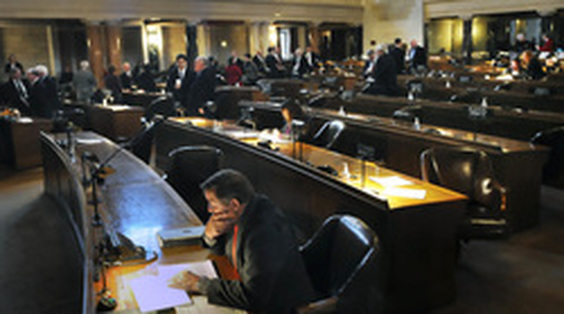
The Nebraska state Senate this week tabled a gun permit bill that would have recognized military members' same-sex spouses despite the state's ban on gay marriage.
While debating a bill that would have made it easier for out-of-state military spouses to acquire conceal carry permits last week, state senators approved an amendment that would allow any military spouse recognized by the federal government to apply for a permit.
However Sen. Dave Bloomfield (R), the gun bill's sponsor, asked that the legislation be put on hold until the Supreme Court address same sex marriage.
"How we got the whole issue of gay marriage combined with concealed carry is beyond me," Bloomfield said on Monday, according to the Omaha World-Herald News Service.
Bloomfield said last week that he didn't think the amendment would undermine the state's ban on gay marriage, but according to the World-Herald some state lawmakers questioned whether the amendment would amount to recognition of gay marriage.
While debating a bill that would have made it easier for out-of-state military spouses to acquire conceal carry permits last week, state senators approved an amendment that would allow any military spouse recognized by the federal government to apply for a permit.
However Sen. Dave Bloomfield (R), the gun bill's sponsor, asked that the legislation be put on hold until the Supreme Court address same sex marriage.
"How we got the whole issue of gay marriage combined with concealed carry is beyond me," Bloomfield said on Monday, according to the Omaha World-Herald News Service.
Bloomfield said last week that he didn't think the amendment would undermine the state's ban on gay marriage, but according to the World-Herald some state lawmakers questioned whether the amendment would amount to recognition of gay marriage.
Court halts same-sex marriage lawsuits in North Dakota
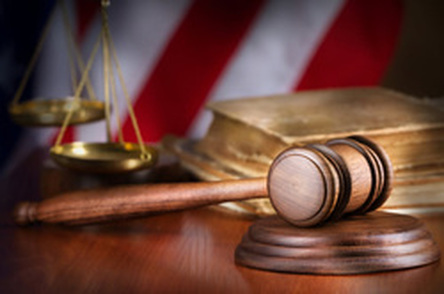
Following news the U.S. Supreme Court would consider the issue of marriage rights for same-sex couples, a federal judge has halted lawsuits seeking the legalization of gay nuptials in North Dakota until the high court renders further guidance.
Without explanation, Chief Judge Ralph Erickson, an appointee of George W. Bush, indicated he’s placed a stay on the two cases pending “a decision by the United States Supreme Court in four consolidated cases.”
On Friday, the Supreme Court granted certiorari in four cases seeking marriage rights for same-sex couples in Michigan, Ohio, Kentucky and Tennessee. The expectation is justices will deliver a nationwide ruling on the marriage issue that will inform lower courts by the middle of this year.
The two cases pending before the judge were Ramsay et al v. Dalrymple et al, which was filed by Minneapolis-based law firm Madia Law LLC and the National Center for Lesbian Rights, and Jorgensen et al v. Montplaisir et al, which was filed by private attorneys and the LGBT group Lambda Legal.
Chris Stoll, a senior attorney at the National Center for Lesbian Rights, said he’s “disappointed” the district court won’t rule on litigation in North Dakota as judges have in many other states.
“North Dakota is one of a few remaining states where same-sex couples are denied the freedom to marry, and the harms imposed by that ban are continuing, real, and in some cases, irreparable,” Stoll said. “Every day the ban remains in place, gay, lesbian, and bisexual people are denied one of the most basic freedoms in our society — and deprived of the basic protections that protect families in the face of illness, crisis, and death.”
Joshua Newville, an associate attorney at Madia Law, expressed disappointment Erickson has elected to wait as same-sex couples seek the right to marry.
“The plaintiff couples brought this case on June 6, 2014,” Newville said. “Their case was fully presented to the court on September 5, 2014. They have been waiting for over four months. They were saddened to learn today they must now wait yet another half year for a ruling on whether their families can be treated as second class.”
Kyle Palazzolo, a staff attorney in the Midwest Regional Office of Lambda Legal, also expressed disappointment no action would be taken in North Dakota until the Supreme Court rules.
“We’re disappointed that the court didn’t take action, there are same-sex couples who are waiting for and need a decision on this as soon as possible,” Palazzolo said. “We also don’t think there’s anything that should stop the trial court from acting on this case just because of the news out of the Supreme Court.”
Asked whether Lambda would seek to challenge the stay on the litigation, Palazzolo replied, “That’s not something we’ve discussed at this point.”
Just last week, a federal court struck down the ban on same-sex marriage in South Dakota as a result of related litigation in that state. U.S. District Judge Karen Schreier placed her decision on hold until appeals in the case are complete, although plaintiffs in the case have pledged to challenge the stay.
Without explanation, Chief Judge Ralph Erickson, an appointee of George W. Bush, indicated he’s placed a stay on the two cases pending “a decision by the United States Supreme Court in four consolidated cases.”
On Friday, the Supreme Court granted certiorari in four cases seeking marriage rights for same-sex couples in Michigan, Ohio, Kentucky and Tennessee. The expectation is justices will deliver a nationwide ruling on the marriage issue that will inform lower courts by the middle of this year.
The two cases pending before the judge were Ramsay et al v. Dalrymple et al, which was filed by Minneapolis-based law firm Madia Law LLC and the National Center for Lesbian Rights, and Jorgensen et al v. Montplaisir et al, which was filed by private attorneys and the LGBT group Lambda Legal.
Chris Stoll, a senior attorney at the National Center for Lesbian Rights, said he’s “disappointed” the district court won’t rule on litigation in North Dakota as judges have in many other states.
“North Dakota is one of a few remaining states where same-sex couples are denied the freedom to marry, and the harms imposed by that ban are continuing, real, and in some cases, irreparable,” Stoll said. “Every day the ban remains in place, gay, lesbian, and bisexual people are denied one of the most basic freedoms in our society — and deprived of the basic protections that protect families in the face of illness, crisis, and death.”
Joshua Newville, an associate attorney at Madia Law, expressed disappointment Erickson has elected to wait as same-sex couples seek the right to marry.
“The plaintiff couples brought this case on June 6, 2014,” Newville said. “Their case was fully presented to the court on September 5, 2014. They have been waiting for over four months. They were saddened to learn today they must now wait yet another half year for a ruling on whether their families can be treated as second class.”
Kyle Palazzolo, a staff attorney in the Midwest Regional Office of Lambda Legal, also expressed disappointment no action would be taken in North Dakota until the Supreme Court rules.
“We’re disappointed that the court didn’t take action, there are same-sex couples who are waiting for and need a decision on this as soon as possible,” Palazzolo said. “We also don’t think there’s anything that should stop the trial court from acting on this case just because of the news out of the Supreme Court.”
Asked whether Lambda would seek to challenge the stay on the litigation, Palazzolo replied, “That’s not something we’ve discussed at this point.”
Just last week, a federal court struck down the ban on same-sex marriage in South Dakota as a result of related litigation in that state. U.S. District Judge Karen Schreier placed her decision on hold until appeals in the case are complete, although plaintiffs in the case have pledged to challenge the stay.
Louisiana Gov. Bobby (Flip-Flop) Jindal changed his religion!
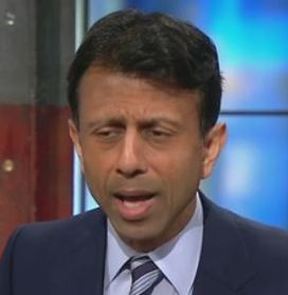
Louisiana Gov. Bobby Jindal won't join the ranks of politicians who have "so called evolved" on same-sex marriage, he said Tuesday.
Jindal, a Republican who is considering a presidential run, suggested that politicians like President Barack Obama and former Secretary of State Hillary Clinton changed their views on gay marriage because of polling indicating more Americans in support of gay marriage.
This man is known for his flip-flop agenda, Jindal was raised in a Hindu household. He converted to Christianity. During his first year at Brown University, he was received into the Roman Catholic Church, Whether he is Hindu or Christian, both religions teach hatred toward gays and lesbians. If a person can turn their back on their own GOD, imagine what they will do to us mere mortals.
Jindal, a Republican who is considering a presidential run, suggested that politicians like President Barack Obama and former Secretary of State Hillary Clinton changed their views on gay marriage because of polling indicating more Americans in support of gay marriage.
This man is known for his flip-flop agenda, Jindal was raised in a Hindu household. He converted to Christianity. During his first year at Brown University, he was received into the Roman Catholic Church, Whether he is Hindu or Christian, both religions teach hatred toward gays and lesbians. If a person can turn their back on their own GOD, imagine what they will do to us mere mortals.
South Dakota Gay Marriage Ban Ruled Unconstitutional
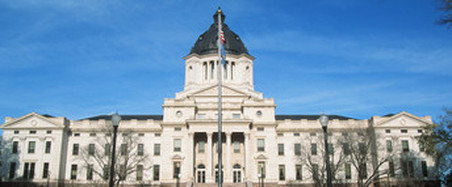
A judge ruled South Dakota's gay marriage ban unconstitutional on Monday.
U.S. District Court Judge Karen E. Schreier wrote that the plaintiffs in the case "have a fundamental right to marry."
"South Dakota law deprives them of that right solely because they are same-sex couples and without sufficient justification," Schreier wrote.
The decision is stayed pending a possible appeal to the Eighth Circuit Court of Appeals.
U.S. District Court Judge Karen E. Schreier wrote that the plaintiffs in the case "have a fundamental right to marry."
"South Dakota law deprives them of that right solely because they are same-sex couples and without sufficient justification," Schreier wrote.
The decision is stayed pending a possible appeal to the Eighth Circuit Court of Appeals.
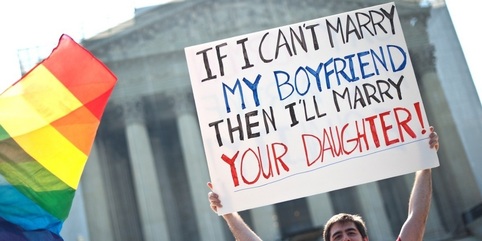
By Jonathan Kaminsky
MOBILE, Ala. (Reuters) - A federal judge on Thursday ordered an Alabama official to comply with her earlier ruling striking down the state's ban on same-sex matrimony and start issuing marriage licenses to gay couples, while advocates said couples in most counties were still unable to obtain licenses.
U.S. District Judge Callie Granade's order clarified that Mobile County Probate Court Judge Don Davis should follow her directive despite a contravening order from Alabama Supreme Court Justice Roy Moore that led many state judges to refrain from issuing marriage licenses to gay couples.
The ruling marked the latest twist in the controversy over gay marriage in Alabama, where probate judges have faced conflicting orders from federal and state courts. The resulting disarray has allowed some same-sex couples to marry in places such as Birmingham, while those applying for marriage licenses in dozens of counties were turned away.
Granade's order applied specifically to Mobile County, where, within an hour of the ruling, same-sex couples who had been waiting in line at a county building began to receive licenses.
Judges in the other 43 of Alabama's 67 counties that have refused to issue marriage licenses to same-sex couples did not immediately begin issuing them in the wake of Granade's order, advocates said.
J. Michael Druhan, the lawyer for Mobile County Probate Judge Don Davis, whose county is the most populous of those that have refused to issue the licenses, said his client was stuck between the conflicting court directives and simply wanted guidance.
Druhan likened Davis, who had kept his office's marriage license operations shuttered since Granade's earlier ruling went into effect on Monday, to a U.S. soldier frozen to the spot after stepping on a mine in a Vietnamese paddy field.
"If he stands there and does nothing, the snipers are going to shoot him in the head," he said. "If he moves, the mine's going to blow him to pieces."
The U.S. Supreme Court, in a strong signal in favor of gay marriage, refused on Monday to grant a request to keep the weddings on hold until the high court decides later this year whether laws banning gay matrimony violate the U.S. Constitution.
Most legal experts say Alabama's probate judges, who are elected officials in a state that passed a gay marriage ban in 2006 with 81 percent of the vote, will ultimately have little choice but to follow the federal court's ruling.
Among those watching Thursday's proceedings from the courtroom filled with supporters of gay rights was Toni Quinones, a 34-year-old lesbian from Mobile.
"We're no different than anybody else," she said. "We deserve to be able to marry who we love, just like heterosexual couples.
MOBILE, Ala. (Reuters) - A federal judge on Thursday ordered an Alabama official to comply with her earlier ruling striking down the state's ban on same-sex matrimony and start issuing marriage licenses to gay couples, while advocates said couples in most counties were still unable to obtain licenses.
U.S. District Judge Callie Granade's order clarified that Mobile County Probate Court Judge Don Davis should follow her directive despite a contravening order from Alabama Supreme Court Justice Roy Moore that led many state judges to refrain from issuing marriage licenses to gay couples.
The ruling marked the latest twist in the controversy over gay marriage in Alabama, where probate judges have faced conflicting orders from federal and state courts. The resulting disarray has allowed some same-sex couples to marry in places such as Birmingham, while those applying for marriage licenses in dozens of counties were turned away.
Granade's order applied specifically to Mobile County, where, within an hour of the ruling, same-sex couples who had been waiting in line at a county building began to receive licenses.
Judges in the other 43 of Alabama's 67 counties that have refused to issue marriage licenses to same-sex couples did not immediately begin issuing them in the wake of Granade's order, advocates said.
J. Michael Druhan, the lawyer for Mobile County Probate Judge Don Davis, whose county is the most populous of those that have refused to issue the licenses, said his client was stuck between the conflicting court directives and simply wanted guidance.
Druhan likened Davis, who had kept his office's marriage license operations shuttered since Granade's earlier ruling went into effect on Monday, to a U.S. soldier frozen to the spot after stepping on a mine in a Vietnamese paddy field.
"If he stands there and does nothing, the snipers are going to shoot him in the head," he said. "If he moves, the mine's going to blow him to pieces."
The U.S. Supreme Court, in a strong signal in favor of gay marriage, refused on Monday to grant a request to keep the weddings on hold until the high court decides later this year whether laws banning gay matrimony violate the U.S. Constitution.
Most legal experts say Alabama's probate judges, who are elected officials in a state that passed a gay marriage ban in 2006 with 81 percent of the vote, will ultimately have little choice but to follow the federal court's ruling.
Among those watching Thursday's proceedings from the courtroom filled with supporters of gay rights was Toni Quinones, a 34-year-old lesbian from Mobile.
"We're no different than anybody else," she said. "We deserve to be able to marry who we love, just like heterosexual couples.
Supreme Court won't hear Louisiana gay marriage case
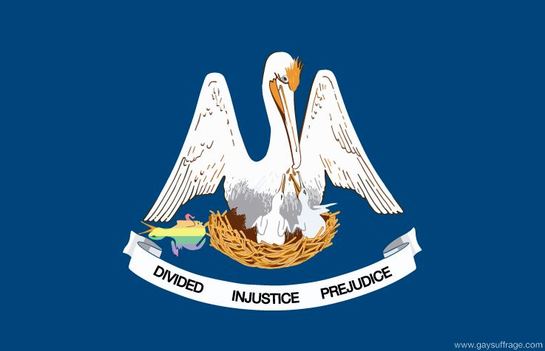
The Supreme Court denied a plea from gay and lesbian couples in Louisiana on Monday that it consider striking down the state's ban against same-sex marriage.
The decision means that a district court ruling upholding the ban there first must be challenged in a federal appeals court, where it was argued Friday along with cases from Texas and Mississippi.
Four other cases from Michigan, Ohio, Kentucky and Tennessee remain pending at the high court, however. The justices could accept one or more of those cases for argument later this week.
The decision means that a district court ruling upholding the ban there first must be challenged in a federal appeals court, where it was argued Friday along with cases from Texas and Mississippi.
Four other cases from Michigan, Ohio, Kentucky and Tennessee remain pending at the high court, however. The justices could accept one or more of those cases for argument later this week.
Alabama ordered to issue marriage licenses to gay couples
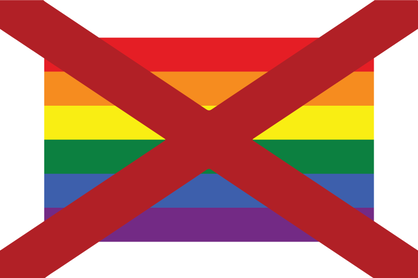
A federal judge on Thursday ordered an Alabama official to start issuing marriage licenses to gay couples in compliance with an earlier order, but couples in most counties were still unable to obtain licenses.
U.S. District Judge Callie Granade's order clarified that Mobile County Probate Court Judge Don Davis was compelled to adhere to her previous ruling striking down the state's gay marriage ban despite a contravening order from Alabama Supreme Court Justice Roy Moore that led many state judges to refrain from issuing licenses to gay couples.
Granade's directive marked the latest twist in the controversy over gay marriage in Alabama, where probate judges have faced conflicting orders from federal and state courts. The resulting disarray has allowed same-sex couples to marry in places such as Birmingham, while those applying for marriage licenses in dozens of counties have been turned away.
Alabama is the 37th U.S. state where gay marriage has been legalized, and the first in the Deep South, where many voters are socially conservative.
The U.S. Supreme Court refused on Monday to grant a request from Alabama's Republican attorney general to keep the weddings on hold until it decides later this year whether laws banning gay matrimony violate the U.S. Constitution.
U.S. District Judge Callie Granade's order clarified that Mobile County Probate Court Judge Don Davis was compelled to adhere to her previous ruling striking down the state's gay marriage ban despite a contravening order from Alabama Supreme Court Justice Roy Moore that led many state judges to refrain from issuing licenses to gay couples.
Granade's directive marked the latest twist in the controversy over gay marriage in Alabama, where probate judges have faced conflicting orders from federal and state courts. The resulting disarray has allowed same-sex couples to marry in places such as Birmingham, while those applying for marriage licenses in dozens of counties have been turned away.
Alabama is the 37th U.S. state where gay marriage has been legalized, and the first in the Deep South, where many voters are socially conservative.
The U.S. Supreme Court refused on Monday to grant a request from Alabama's Republican attorney general to keep the weddings on hold until it decides later this year whether laws banning gay matrimony violate the U.S. Constitution.
'We Will Burn:' Texas Pastor to Set Himself Aflame if Marriage Equality Wins (gaysuffrage.com offers to supply matches!)
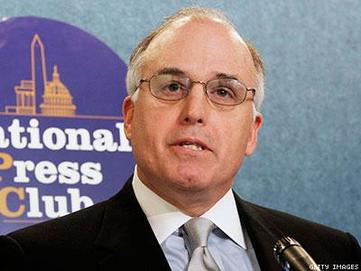
'We Will Burn:' Texas Pastor to Set Himself Aflame if Marriage Equality WinsThe architect of a massive effort to challenge a pro-LGBT ruling by the Supreme Court has also offered to be shot.
BY DAWN ENNIS
JUNE 22 2015 2:38 PM ET
Pastor Rick Scarborough
Rick Scarborough, the anti-gay Texas pastor who already made headlines with a full-page newspaper ad announcing that he had at least 44,500 followers who pledged to go to jail to defend so-called traditional marriage, is now threatening to set himself on fire to stop marriage equality.
“We’re simply being preemptive and saying, no matter what the cost, we are not going to bow, we are not going to bend, and we will burn,” said Scarborough on a recent National Emergency Coalition conference call hosted by fellow anti-gay preacher E.W. Jackson.
“The preachers need to get out front, the leaders need to get out front, out front of these ordinary citizens and say, ‘Shoot me first,’” said Scarborough said, according to Right Wing Watch. The pastor was reportedly referring to business owners such as bakers and florists who claim to be victims of nondiscrimination laws (which would not be directly impacted by the pending Supreme Court decision on marriage equality).
On the conference call that took place June 16, Scarborough labeled gay marriage a Satanic plot:
“The end-game is the complete destruction of the church of the Lord Jesus, the replacement of it with this liberal theology that’s not a theology, it’s a philosophy, human-made, it goes back to the Garden of Eden when Satan wanted to be God. We now have a race of humans that don’t want to acknowledge that there’s a God.”
“They’re after God,” he said of the nine Supreme Court justices who are expected to rule soon on whether state bans on same-sex marriage should be struck down. “This country better be aware, we’ve suffered a lot of injustices, but I’m not sure God is going to tolerate this one very long.
BY DAWN ENNIS
JUNE 22 2015 2:38 PM ET
Pastor Rick Scarborough
Rick Scarborough, the anti-gay Texas pastor who already made headlines with a full-page newspaper ad announcing that he had at least 44,500 followers who pledged to go to jail to defend so-called traditional marriage, is now threatening to set himself on fire to stop marriage equality.
“We’re simply being preemptive and saying, no matter what the cost, we are not going to bow, we are not going to bend, and we will burn,” said Scarborough on a recent National Emergency Coalition conference call hosted by fellow anti-gay preacher E.W. Jackson.
“The preachers need to get out front, the leaders need to get out front, out front of these ordinary citizens and say, ‘Shoot me first,’” said Scarborough said, according to Right Wing Watch. The pastor was reportedly referring to business owners such as bakers and florists who claim to be victims of nondiscrimination laws (which would not be directly impacted by the pending Supreme Court decision on marriage equality).
On the conference call that took place June 16, Scarborough labeled gay marriage a Satanic plot:
“The end-game is the complete destruction of the church of the Lord Jesus, the replacement of it with this liberal theology that’s not a theology, it’s a philosophy, human-made, it goes back to the Garden of Eden when Satan wanted to be God. We now have a race of humans that don’t want to acknowledge that there’s a God.”
“They’re after God,” he said of the nine Supreme Court justices who are expected to rule soon on whether state bans on same-sex marriage should be struck down. “This country better be aware, we’ve suffered a lot of injustices, but I’m not sure God is going to tolerate this one very long.
The Supreme Court gay marriage arguments: What the justices revealed — quote by quote
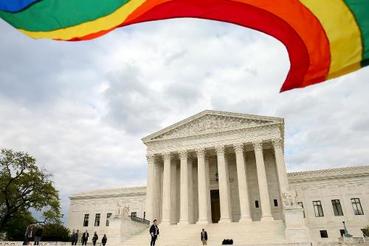
In the same-sex-marriage oral arguments at the Supreme Court on Tuesday, eight of the justices revealed their personalities and their very different approaches to marriage equality in particular and the Constitution in general. What follows are the most revealing quotes, in order of seniority, from each of the justices who spoke at the argument (Justice Thomas was silent), along with their central concern and contribution to the debate.
Chief Justice Roberts has long been troubled by the idea that courts might short-circuit a democratic debate over marriage equality by imposing a constitutional right to marry by judicial fiat. In his dissent from the Windsor case in 2013, he wrote that he was reluctant to “tar the political branches with the brush of bigotry” without convincing evidence that a law’s “principal purpose was to codify malice.” He might vote to uphold same-sex-marriage bans on the grounds that the people, not judges, should decide the future of marriage.
Roberts also hinted that same-sex-marriage bans might be vulnerable as a form of sex discrimination. “I’m not sure it’s necessary to get into sexual orientation to resolve the case,” he said. “I mean, if Sue loves Joe and Tom loves Joe, Sue can marry him and Tom can’t. And the difference is based upon their different sex. Why isn’t that a straightforward question of sexual discrimination?” Still, a majority of the court seems more interested in striking down the bans as a violation of liberty, equality, and dignity, and it would be surprising if Roberts joined majority opinion emphasizing sex discrimination.
Chief Justice Roberts has long been troubled by the idea that courts might short-circuit a democratic debate over marriage equality by imposing a constitutional right to marry by judicial fiat. In his dissent from the Windsor case in 2013, he wrote that he was reluctant to “tar the political branches with the brush of bigotry” without convincing evidence that a law’s “principal purpose was to codify malice.” He might vote to uphold same-sex-marriage bans on the grounds that the people, not judges, should decide the future of marriage.
Roberts also hinted that same-sex-marriage bans might be vulnerable as a form of sex discrimination. “I’m not sure it’s necessary to get into sexual orientation to resolve the case,” he said. “I mean, if Sue loves Joe and Tom loves Joe, Sue can marry him and Tom can’t. And the difference is based upon their different sex. Why isn’t that a straightforward question of sexual discrimination?” Still, a majority of the court seems more interested in striking down the bans as a violation of liberty, equality, and dignity, and it would be surprising if Roberts joined majority opinion emphasizing sex discrimination.
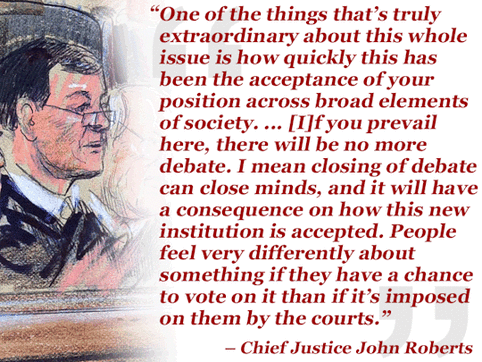
Justice Scalia was especially troubled by the possibility that ministers might be required to conduct same-sex weddings that violated their religious convictions. Some commentators seized on his question as evidence that he believes the constitutional recognition of same-sex marriage is inevitable and wants to engage in damage control. Justice Kagan responded that rabbis at the moment are not required to marry Jews and non-Jews. She spoke from experience, having had to persuade her own New York City rabbi to conduct his first bat mitzvah after she turned 12.
Since the Lawrence decision in 2003, Justice Kennedy has insisted that laws disadvantaging gays and lesbians violate their dignity and their constitutional rights to liberty and equality. Kennedy’s focus on dignity has been so influential in lower-court decisions that lawyers on both sides referred to dignity no fewer than 16 times. Kennedy’s 2003 opinion emphasizing the dignity of LGBT couples led Scalia to predict that the decision would inevitably lead to the end of bans on same-sex marriage, despite Kennedy’s claims to the contrary. Now Scalia’s dissent looks especially prescient.
Justice Ginsburg has been described as the Thurgood Marshall of the women’s movement, and she invoked her experience as a litigator for women’s rights to question the conservative justices’ claim that allowing gays and lesbians to marry would transform the definition of marriage. In fact, Ginsburg argued, the definition of marriage was transformed after the women’s movement led to the demise of laws that treated wives as the property of their husbands. Because marriage has, in recent years, become increasingly inclusive, Ginsburg suggested, gays and lesbians deserve the same equal treatment as women and other previously disadvantaged groups.
Justice Breyer’s question surprised some same-sex-marriage proponents, who have counted him a reliable vote on their side. In fact, he seems to have been testing the thesis of his book “Active Liberty,” which argues that courts should generally defer to democratic decision makers unless fundamental rights are being infringed. Breyer’s ultimate vote for same-sex marriage seems implicit in his subsequent observation: “After all, marriage is about as basic a right as there is; that the Constitution and Amendment 14 does say you cannot deprive a person of liberty, certainly of basic liberty, without due process of law; and that to take a group of people where so little distinguishes them from the people you gave the liberty to, at least in terms of a good reason not to, and you don’t let them participate in this basic institution … that violates the 14th Amendment …”
Justice Alito is a history scholar who has eloquently argued for the preservation of tradition. He noted that ancient Greek philosophers, such as Plato, wrote approvingly of same-sex relationships, even though the ancient Greek city-state did not recognize same-sex marriage. Alito, who often asks the hardest questions at oral argument, went on to ask why, if marriage were a fundamental right, four people — “let’s say they’re all consenting adults, highly educated. They’re all lawyers” — could be denied the right to marry and form a single union. The lawyer’s response — that four lawyers were unlikely to consent to this relationship — didn’t seem to satisfy him.
More than any of the justices, Justice Sotomayor focused on what she identified as the basic question of whether the right to marriage is a fundamental right. If so, she said, it had to be extended to all citizens on equal terms. Cutting through the abstractions about dignity or the legalistic debate about tiers of constitutional scrutiny, Sotomayor sought to provide a broad, basic framework for resolving the case in terms all citizens can understand.
Justice Kagan was skeptical of the empirical claims made by same-sex-marriage opponents: namely, that bans on marriage by gay people would encourage responsible procreation by straight people by emphasizing the connection between marriage and procreation. Kagan asked whether it would be constitutional for the state to deny marriage licenses to straight couples who said they didn’t want to have children. She also questioned the state’s claim that allowing same-sex marriage would harm traditional families. Kagan found it “inexplicable” that Ohio was suggesting adopted children would be better off if raised by married straight parents but not by married gay parents.
Predicting the outcome of a case by the questions asked at a Supreme Court oral argument is always hazardous, but based on their past constitutional positions, there seem to be at least five justices — Kennedy plus the liberals — who are ready to recognize some version of a right to same-sex marriage. For more analysis, listen to the National Constitution Center’s We the People podcast discussion of the same-sex-marriage oral arguments.
Since the Lawrence decision in 2003, Justice Kennedy has insisted that laws disadvantaging gays and lesbians violate their dignity and their constitutional rights to liberty and equality. Kennedy’s focus on dignity has been so influential in lower-court decisions that lawyers on both sides referred to dignity no fewer than 16 times. Kennedy’s 2003 opinion emphasizing the dignity of LGBT couples led Scalia to predict that the decision would inevitably lead to the end of bans on same-sex marriage, despite Kennedy’s claims to the contrary. Now Scalia’s dissent looks especially prescient.
Justice Ginsburg has been described as the Thurgood Marshall of the women’s movement, and she invoked her experience as a litigator for women’s rights to question the conservative justices’ claim that allowing gays and lesbians to marry would transform the definition of marriage. In fact, Ginsburg argued, the definition of marriage was transformed after the women’s movement led to the demise of laws that treated wives as the property of their husbands. Because marriage has, in recent years, become increasingly inclusive, Ginsburg suggested, gays and lesbians deserve the same equal treatment as women and other previously disadvantaged groups.
Justice Breyer’s question surprised some same-sex-marriage proponents, who have counted him a reliable vote on their side. In fact, he seems to have been testing the thesis of his book “Active Liberty,” which argues that courts should generally defer to democratic decision makers unless fundamental rights are being infringed. Breyer’s ultimate vote for same-sex marriage seems implicit in his subsequent observation: “After all, marriage is about as basic a right as there is; that the Constitution and Amendment 14 does say you cannot deprive a person of liberty, certainly of basic liberty, without due process of law; and that to take a group of people where so little distinguishes them from the people you gave the liberty to, at least in terms of a good reason not to, and you don’t let them participate in this basic institution … that violates the 14th Amendment …”
Justice Alito is a history scholar who has eloquently argued for the preservation of tradition. He noted that ancient Greek philosophers, such as Plato, wrote approvingly of same-sex relationships, even though the ancient Greek city-state did not recognize same-sex marriage. Alito, who often asks the hardest questions at oral argument, went on to ask why, if marriage were a fundamental right, four people — “let’s say they’re all consenting adults, highly educated. They’re all lawyers” — could be denied the right to marry and form a single union. The lawyer’s response — that four lawyers were unlikely to consent to this relationship — didn’t seem to satisfy him.
More than any of the justices, Justice Sotomayor focused on what she identified as the basic question of whether the right to marriage is a fundamental right. If so, she said, it had to be extended to all citizens on equal terms. Cutting through the abstractions about dignity or the legalistic debate about tiers of constitutional scrutiny, Sotomayor sought to provide a broad, basic framework for resolving the case in terms all citizens can understand.
Justice Kagan was skeptical of the empirical claims made by same-sex-marriage opponents: namely, that bans on marriage by gay people would encourage responsible procreation by straight people by emphasizing the connection between marriage and procreation. Kagan asked whether it would be constitutional for the state to deny marriage licenses to straight couples who said they didn’t want to have children. She also questioned the state’s claim that allowing same-sex marriage would harm traditional families. Kagan found it “inexplicable” that Ohio was suggesting adopted children would be better off if raised by married straight parents but not by married gay parents.
Predicting the outcome of a case by the questions asked at a Supreme Court oral argument is always hazardous, but based on their past constitutional positions, there seem to be at least five justices — Kennedy plus the liberals — who are ready to recognize some version of a right to same-sex marriage. For more analysis, listen to the National Constitution Center’s We the People podcast discussion of the same-sex-marriage oral arguments.
March For Marriage in Washington, D.C.
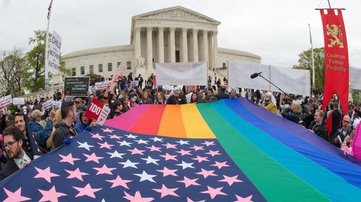
Protesters hold a pro-gay-rights flag outside the US Supreme Court on Saturday, countering the demonstrators who attended the March For Marriage in Washington, D.C. The Supreme Court meets on Tuesday to hear arguments over whether same-sex couples have a constitutional right to wed in the United States, with a final decision expected in June.
People have been lining up outside the U.S. Supreme Court for days hoping that they will be among the lucky ones to get a seat for Tuesday's historic arguments on gay marriage.
As of now, gay marriage is legal in 36 states. By the end of this Supreme Court term, either same-sex couples will be able to wed in all 50 states, or gay marriage bans may be re instituted in many of the states where they've previously been struck down.
Tuesday's Supreme Court arguments focus on two questions: First, whether bans on gay marriage are constitutional; and second, if they are, whether those states with bans may refuse to recognize out-of-state gay marriages performed where they are legal.
The court has scheduled an extraordinary 2 1/2 hours of argument and will make the audio available online later Tuesday.
Four states — Michigan, Ohio, Tennessee and Kentucky — are defending their bans. They won their case in the lower court, and because other appeals courts threw out bans enacted in other states, the Supreme Court now must resolve the conflict.
The high-stakes legal battle is the culmination of a decades-long struggle in the courts, state legislatures and at the ballot box. During that time, public opinion has changed, and done so more rapidly — and dramatically — than on any major social issue in memory.
In 1996, public opinion polls showed, on average, only 27 percent of the public favored legalization; this year, although many states still adamantly resist gay marriage, public opinion polls put the approval number nationally at well over 50 percent.
Tuesday's courtroom battle pits states' rights against the fundamental right to marry; it pits the traditional definition of marriage against a more modern definition; and it pits majority rights against minority rights.
Before the court are the consolidated cases of 12 couples and two widowers. Among them are nurses, teachers, veterinarians, an Army sergeant and businessmen and women.
Many call themselves "accidental activists," because they filed lawsuits not to further a cause but because of the way the bans affected their lives.
In Michigan, for instance, Jayne Rowse and April DeBoer have four adopted children, two with disabilities. Because the state does not allow same-sex couples to adopt, but does allow single people to adopt, each of the women has adopted two of the children.
"We have a marriage," says DeBoer. "We just don't have a piece of paper that legally binds us to each other."
The wake-up call about their legal status came on a two-lane highway one snowy night when a truck traveling in the wrong lane veered into a field to avoid hitting them head-on. After that harrowing near-miss, they started putting wills and trusts into place to protect the children.
But there was one thing they couldn't do: make sure that if one of them died, the other would get custody of the two children who had been formally adopted by the deceased parent.
"A judge could award that child to someone else," says Rowse, "effectively making them a legal stranger to the child they've helped raise since birth."
So to challenge the state adoption laws, they challenged the ban on gay marriage.
Michigan Attorney General Bill Schuette defends his state's ban as an example of democratic rule.
"Who decides: the courts or the voters?" Schuette asks, rhetorically. "There are 2.7 million people — voters — who made this decision."
But gay-marriage advocate Mary Bonauto counters that this country does not put the fundamental constitutional rights of minorities to a vote.
"This is not about self-government or persuading voters," argues Bonauto. "It's about the Constitution and whether, constitutionally, same-sex couples can be denied the right to marry that all other Americans enjoy."
Arguing against her Tuesday will be lawyer John Bursch, representing Michigan and the other states. His task is to convince the justices that Michigan has a rational justification for banning gay marriage.
"It's really not possible to say that the marriage definition Michigan has had since 1805, when it was still a territory before statehood, has all this time been irrational," Bursch says.
Bonauto replies that it doesn't really matter what people thought at the time the Constitution was written because the Fourteenth Amendment, adopted after the Civil War, guarantees "equal protection of the laws."
"And this is a court that has recognized time and again that we have to look at current conditions in deciding what equality means," Bonauto adds.
Indeed, the Supreme Court has repeatedly said that marriage is a fundamental right that the state cannot abridge without some real justification. It has said that prisoners have the right to marry, and so do people too poor to make child support payments.
And most famously, in 1967, the court struck down state bans on interracial marriage.
So what are the justifications offered by the states? They cite procreation.
"Michigan has a legitimate interest in encouraging opposite-sex couples to enter into permanent, exclusive unions within which to have and raise children," argues Bursch.
Bonauto counters that Michigan allows heterosexual couples to marry even if they are infertile, too old to have children or don't want to.
Bursch cites other justifications, arguing that men and women bring different attributes to child-rearing in a marriage.
"Having that diversity of both the mother and a father can be a good thing for children," Bursch says.
Bonauto will tell the justices that by denying same-sex couples the right to marry, states are imposing concrete hardships. Because they are not considered one family, unmarried same-sex couples have to buy two health insurance plans to cover themselves and their children; if one of them should die, the other partner and his or her adopted children are not entitled to Social Security benefits. And indeed, the parent whose name is not on the adoption papers could lose custody.
"Denying same-sex couples marriage means that you are increasing the number of children who are raised outside of marriage," Bonauto says. The bans in turn deny "a whole class of children that security, that protection" of marriage, "and tell these children and their parents that they "are not worthy of this most important relationship in life," Bonauto says.
Bursch replies that the states are not trying to disparage anyone.
"It comes down to who gets to decide between competing marriage models, which many people feel very strongly about," Bursch argues. He reiterates that the choice is up to the electorate, "and if the courts start imposing their own view of what marriage should be, that's going to do huge damage to the democratic liberty principle that has always animated our Constitution."
The second question being debated in the Supreme Court Tuesday is whether states that ban same-sex marriage may refuse to recognize legal marriages performed out of state.
The standard-bearer for the recognition cases, and indeed, all the cases, is widower Jim Obergefell. Because his lawsuit was filed first, all of the consolidated cases are known as Obergefell v. Hodges (Richard Hodges is the Ohio official in charge of death certificates).
It is the death certificate of Obergefell's longtime partner that is at the center of the recognition question.
Obergefell and John Arthur were together for 20 years. But by 2013, Arthur was bedridden and dying of ALS (also known as Lou Gehrig's disease). On June 26, the two men were watching TV as news flashed across the screen that the Supreme Court had struck down the federal law barring the national government from recognizing gay marriages performed in states where they are legal.
"I just immediately leaned over, hugged him, gave him a kiss and said, let's get married," Obergefell recalls. "It just seemed like the most perfect thing possible to do at the moment."
Friends and family quickly raised the money for a medical charter to Maryland, where gay marriage is legal. The couple exchanged vows as the plane sat on the tarmac and then headed back to Cincinnati.
Just a few days later, though, the two would learn that Ohio would not recognize Jim as a surviving spouse on John's death certificate.
"It was heartbreaking," Obergefell says.
A federal judge, acting on an expedited basis because of John's health, ordered the state of Ohio to record Jim as the surviving spouse when the time came
Three months and 11 days later, John Arthur died, and Obergefell's name was listed as the surviving spouse on the death certificate.
The state appealed, and if it wins in the Supreme Court, it can reissue the death certificate without Obergefell's name.
At the Supreme Court Tuesday gay-marriage advocate Douglas Hallward-Driemeier will tell the justices that states have long recognized each other's marriages.
"The history of state recognition of marriage is that a marriage that was valid where it was celebrated is going to be recognized in the new state, even if that couple could not have gotten married in that state," he says.
The reason for that is that people travel across state lines all the time, and their marriage travels with them. It doesn't matter, notes Hallward-Driemeier, that the wife, for instance, is too young to get married in some of the states a couple may subsequently live in or travel through.
The four states defending their gay-marriage bans also defend their anti-recognition laws, but lawyers for the four declined to be interviewed.
Kyle Duncan, who represents 15 other states with nonrecognition laws, argues that the issue of gay marriage is unique, especially in the context of the state's prerogative to define and regulate marriage.
"Before 2003, no state in the United States had recognized same-sex marriage," Duncan says. Indeed, before 2000 no country in the world had recognized same-sex marriage, he observes.
"If it's that new and it involves this bedrock exercise of sovereignty by states," Duncan argues, "it seems to us the right position is to say, then let the states figure it out."
A decision in the case is expected by the end of June.
As of now, gay marriage is legal in 36 states. By the end of this Supreme Court term, either same-sex couples will be able to wed in all 50 states, or gay marriage bans may be re instituted in many of the states where they've previously been struck down.
Tuesday's Supreme Court arguments focus on two questions: First, whether bans on gay marriage are constitutional; and second, if they are, whether those states with bans may refuse to recognize out-of-state gay marriages performed where they are legal.
The court has scheduled an extraordinary 2 1/2 hours of argument and will make the audio available online later Tuesday.
Four states — Michigan, Ohio, Tennessee and Kentucky — are defending their bans. They won their case in the lower court, and because other appeals courts threw out bans enacted in other states, the Supreme Court now must resolve the conflict.
The high-stakes legal battle is the culmination of a decades-long struggle in the courts, state legislatures and at the ballot box. During that time, public opinion has changed, and done so more rapidly — and dramatically — than on any major social issue in memory.
In 1996, public opinion polls showed, on average, only 27 percent of the public favored legalization; this year, although many states still adamantly resist gay marriage, public opinion polls put the approval number nationally at well over 50 percent.
Tuesday's courtroom battle pits states' rights against the fundamental right to marry; it pits the traditional definition of marriage against a more modern definition; and it pits majority rights against minority rights.
Before the court are the consolidated cases of 12 couples and two widowers. Among them are nurses, teachers, veterinarians, an Army sergeant and businessmen and women.
Many call themselves "accidental activists," because they filed lawsuits not to further a cause but because of the way the bans affected their lives.
In Michigan, for instance, Jayne Rowse and April DeBoer have four adopted children, two with disabilities. Because the state does not allow same-sex couples to adopt, but does allow single people to adopt, each of the women has adopted two of the children.
"We have a marriage," says DeBoer. "We just don't have a piece of paper that legally binds us to each other."
The wake-up call about their legal status came on a two-lane highway one snowy night when a truck traveling in the wrong lane veered into a field to avoid hitting them head-on. After that harrowing near-miss, they started putting wills and trusts into place to protect the children.
But there was one thing they couldn't do: make sure that if one of them died, the other would get custody of the two children who had been formally adopted by the deceased parent.
"A judge could award that child to someone else," says Rowse, "effectively making them a legal stranger to the child they've helped raise since birth."
So to challenge the state adoption laws, they challenged the ban on gay marriage.
Michigan Attorney General Bill Schuette defends his state's ban as an example of democratic rule.
"Who decides: the courts or the voters?" Schuette asks, rhetorically. "There are 2.7 million people — voters — who made this decision."
But gay-marriage advocate Mary Bonauto counters that this country does not put the fundamental constitutional rights of minorities to a vote.
"This is not about self-government or persuading voters," argues Bonauto. "It's about the Constitution and whether, constitutionally, same-sex couples can be denied the right to marry that all other Americans enjoy."
Arguing against her Tuesday will be lawyer John Bursch, representing Michigan and the other states. His task is to convince the justices that Michigan has a rational justification for banning gay marriage.
"It's really not possible to say that the marriage definition Michigan has had since 1805, when it was still a territory before statehood, has all this time been irrational," Bursch says.
Bonauto replies that it doesn't really matter what people thought at the time the Constitution was written because the Fourteenth Amendment, adopted after the Civil War, guarantees "equal protection of the laws."
"And this is a court that has recognized time and again that we have to look at current conditions in deciding what equality means," Bonauto adds.
Indeed, the Supreme Court has repeatedly said that marriage is a fundamental right that the state cannot abridge without some real justification. It has said that prisoners have the right to marry, and so do people too poor to make child support payments.
And most famously, in 1967, the court struck down state bans on interracial marriage.
So what are the justifications offered by the states? They cite procreation.
"Michigan has a legitimate interest in encouraging opposite-sex couples to enter into permanent, exclusive unions within which to have and raise children," argues Bursch.
Bonauto counters that Michigan allows heterosexual couples to marry even if they are infertile, too old to have children or don't want to.
Bursch cites other justifications, arguing that men and women bring different attributes to child-rearing in a marriage.
"Having that diversity of both the mother and a father can be a good thing for children," Bursch says.
Bonauto will tell the justices that by denying same-sex couples the right to marry, states are imposing concrete hardships. Because they are not considered one family, unmarried same-sex couples have to buy two health insurance plans to cover themselves and their children; if one of them should die, the other partner and his or her adopted children are not entitled to Social Security benefits. And indeed, the parent whose name is not on the adoption papers could lose custody.
"Denying same-sex couples marriage means that you are increasing the number of children who are raised outside of marriage," Bonauto says. The bans in turn deny "a whole class of children that security, that protection" of marriage, "and tell these children and their parents that they "are not worthy of this most important relationship in life," Bonauto says.
Bursch replies that the states are not trying to disparage anyone.
"It comes down to who gets to decide between competing marriage models, which many people feel very strongly about," Bursch argues. He reiterates that the choice is up to the electorate, "and if the courts start imposing their own view of what marriage should be, that's going to do huge damage to the democratic liberty principle that has always animated our Constitution."
The second question being debated in the Supreme Court Tuesday is whether states that ban same-sex marriage may refuse to recognize legal marriages performed out of state.
The standard-bearer for the recognition cases, and indeed, all the cases, is widower Jim Obergefell. Because his lawsuit was filed first, all of the consolidated cases are known as Obergefell v. Hodges (Richard Hodges is the Ohio official in charge of death certificates).
It is the death certificate of Obergefell's longtime partner that is at the center of the recognition question.
Obergefell and John Arthur were together for 20 years. But by 2013, Arthur was bedridden and dying of ALS (also known as Lou Gehrig's disease). On June 26, the two men were watching TV as news flashed across the screen that the Supreme Court had struck down the federal law barring the national government from recognizing gay marriages performed in states where they are legal.
"I just immediately leaned over, hugged him, gave him a kiss and said, let's get married," Obergefell recalls. "It just seemed like the most perfect thing possible to do at the moment."
Friends and family quickly raised the money for a medical charter to Maryland, where gay marriage is legal. The couple exchanged vows as the plane sat on the tarmac and then headed back to Cincinnati.
Just a few days later, though, the two would learn that Ohio would not recognize Jim as a surviving spouse on John's death certificate.
"It was heartbreaking," Obergefell says.
A federal judge, acting on an expedited basis because of John's health, ordered the state of Ohio to record Jim as the surviving spouse when the time came
Three months and 11 days later, John Arthur died, and Obergefell's name was listed as the surviving spouse on the death certificate.
The state appealed, and if it wins in the Supreme Court, it can reissue the death certificate without Obergefell's name.
At the Supreme Court Tuesday gay-marriage advocate Douglas Hallward-Driemeier will tell the justices that states have long recognized each other's marriages.
"The history of state recognition of marriage is that a marriage that was valid where it was celebrated is going to be recognized in the new state, even if that couple could not have gotten married in that state," he says.
The reason for that is that people travel across state lines all the time, and their marriage travels with them. It doesn't matter, notes Hallward-Driemeier, that the wife, for instance, is too young to get married in some of the states a couple may subsequently live in or travel through.
The four states defending their gay-marriage bans also defend their anti-recognition laws, but lawyers for the four declined to be interviewed.
Kyle Duncan, who represents 15 other states with nonrecognition laws, argues that the issue of gay marriage is unique, especially in the context of the state's prerogative to define and regulate marriage.
"Before 2003, no state in the United States had recognized same-sex marriage," Duncan says. Indeed, before 2000 no country in the world had recognized same-sex marriage, he observes.
"If it's that new and it involves this bedrock exercise of sovereignty by states," Duncan argues, "it seems to us the right position is to say, then let the states figure it out."
A decision in the case is expected by the end of June.
Poll: Americans Say There's No Turning Back On Gay Marriage
WASHINGTON — The Supreme Court will hear arguments next week in a landmark case on gay marriage, but most Americans already have made up their minds: There’s no turning back.
In a nationwide USA Today/Suffolk University Poll, those surveyed say by 51 percent-35 percent that it’s no longer practical for the Supreme Court to ban same-sex marriages because so many states have legalized them.
One reason for a transformation in public views on the issue: Close to half say they have a gay or lesbian family member or close friend who is married to someone of the same sex.
Now he calls himself undecided on the issue.
In the survey, a majority, 51 percent-35 percent, favor allowing gay men and lesbians to marry, and those who support the idea feel more strongly about it than those who oppose it: 28 percent “strongly favor” same-sex marriage, 18 percent “strongly oppose” it. Fourteen percent are undecided.
“Everybody has a right to get married and be unhappy,” joked Joann Fleming, 65, of Los Angeles. She’s divorced.
The poll of 1,000 people, taken by landline and cellphone April 8-13, has a margin of error of plus or minus 3 percentage points.
There have been tidal changes in public opinion toward same-sex marriage — more than a third say they have changed their views on gays and lesbians during their lifetimes — but there also is a huge generation gap. Six in 10 of those 18 to 34 support the idea, compared with fewer than four in 10 of those 65 and older.
And there continue to be conflicted views and some bitter divisions.
While nearly six in 10 Americans oppose a law that would allow people to refuse to provide business services to a same-sex wedding, those on both sides of that debate are concerned about the potential consequences of balancing respect for religious freedom with support for civil rights.
Next Tuesday (April 28), the Supreme Court is scheduled to hear 21/2 hours of oral arguments on cases from Michigan, Ohio, Kentucky and Tennessee that turn on whether gay and lesbian partners have a constitutional right to marry, or whether states have the right to ban the practice. A ruling is expected before the high court’s term ends in late June.
Thirty-six states and the District of Columbia now allow same-sex marriages, most of them as the result of a court decision.
CLASH OF RIGHTS
As more states allow same-sex marriage, disputes have grown over whether individuals and businesses should have the right to refuse to provide services for a gay wedding if they have religious objections.
By almost 2-1, 58 percent-31 percent, those surveyed say they shouldn't. Indeed, more than a third of those who oppose gay marriage also oppose a law that would allow people to cite religious reasons for refusing, say, to provide flowers or catering for a same-sex couple.
A political firestorm erupted last month when Indiana Gov. Mike Pence, a Republican, signed the Religious Freedom Restoration Act, which said the government could not “substantially burden” a person’s ability to follow their religious beliefs. Amid protests the law would open the door to discrimination against gays, the state hurriedly enacted a follow-up provision that banned use of the law to defend discrimination based on sexual orientation.
“It’s nobody’s right to say, ‘This is right or this is wrong’ or exclude a certain group of people,” said Ashley Williams, 25, an elementary school teacher from Durham, N.C. “Just because they’re gay doesn't mean they’re any less human.”
If a local business refused to provide services to a same-sex wedding – say, the rental of a reception hall – she says she’d be inclined to refuse to patronize the business herself.
But others disagree. “It’s in the eyes of God,” said Robert Robilliad, 61, a postal worker from Sagamore, Mass., who opposes gay marriage on religious grounds.
“A business, they should be allowed to do whatever they want to do without being tormented by higher-ups,” said Virginia Roberts, 85, of Holland, Ohio, who has retired from her job as the secretary at a spark-plug company. She doesn't think gay marriages should be permitted, but she worries that the die on that already has been cast.
“All somebody has to do is start it, anything,” she said. “Once it’s done, from then on, it trickles right down just like a leaf in a pond — right down and everybody does it.”
Most Americans don’t see the issue as being black-and-white:
* •Nearly two-thirds, 63 percent, are concerned that a law requiring businesses to provide services to same-sex weddings would force those involved to go against their religious beliefs or pay a penalty. Even among those who support gay marriage, 17 percent also support a law giving people the right to refuse.
* About the same number, 64 percent, are concerned that a law allowing people to refuse such services on religious grounds would discriminate against gay men and lesbians. Even among those who oppose gay marriage, 37 percent also oppose a law giving people the right to refuse.
In all, four in 10 are worried about the consequences of choosing either course.
BITTER DIVISIONS
On two questions, there is a broad consensus.
Americans believe discrimination against gay men and lesbians continues to be widespread: 28 percent say there is “a great deal” of discrimination; another 44 percent say there is “some.” Fifteen percent say there is “only a little,” and 9 percent see none at all.
And an overwhelming 76 percent oppose revoking a church’s tax-exempt status if it doesn't recognize same-sex marriages. Even among those who favor gay marriage, only one in five would support such a move.
But some bitter divisions remain as those on opposite sides of the issue view one another. In the poll, 35 percent of those opposed to same-sex marriage say they wouldn't respect someone who supported it. And 25 percent of those who favor same-sex marriage say they wouldn't respect someone who opposed it.
The issue is sure to flare during the 2016 presidential campaign.
Democrat Hillary Clinton last week said for the first time that she hopes the Supreme Court rules in favor of a constitutional right to marry, a stance at odds with the Republican field.
GOP hopeful Rick Santorum said he would refuse even to attend the gay wedding of a family member or close friend. But Wisconsin Gov. Scott Walker, also a prospective 2016 Republican contender, told reporters in New Hampshire Saturday that he already had attended a reception for the same-sex wedding of a family member. “That’s certainly a personal issue,” he said.
In a nationwide USA Today/Suffolk University Poll, those surveyed say by 51 percent-35 percent that it’s no longer practical for the Supreme Court to ban same-sex marriages because so many states have legalized them.
One reason for a transformation in public views on the issue: Close to half say they have a gay or lesbian family member or close friend who is married to someone of the same sex.
Now he calls himself undecided on the issue.
In the survey, a majority, 51 percent-35 percent, favor allowing gay men and lesbians to marry, and those who support the idea feel more strongly about it than those who oppose it: 28 percent “strongly favor” same-sex marriage, 18 percent “strongly oppose” it. Fourteen percent are undecided.
“Everybody has a right to get married and be unhappy,” joked Joann Fleming, 65, of Los Angeles. She’s divorced.
The poll of 1,000 people, taken by landline and cellphone April 8-13, has a margin of error of plus or minus 3 percentage points.
There have been tidal changes in public opinion toward same-sex marriage — more than a third say they have changed their views on gays and lesbians during their lifetimes — but there also is a huge generation gap. Six in 10 of those 18 to 34 support the idea, compared with fewer than four in 10 of those 65 and older.
And there continue to be conflicted views and some bitter divisions.
While nearly six in 10 Americans oppose a law that would allow people to refuse to provide business services to a same-sex wedding, those on both sides of that debate are concerned about the potential consequences of balancing respect for religious freedom with support for civil rights.
Next Tuesday (April 28), the Supreme Court is scheduled to hear 21/2 hours of oral arguments on cases from Michigan, Ohio, Kentucky and Tennessee that turn on whether gay and lesbian partners have a constitutional right to marry, or whether states have the right to ban the practice. A ruling is expected before the high court’s term ends in late June.
Thirty-six states and the District of Columbia now allow same-sex marriages, most of them as the result of a court decision.
CLASH OF RIGHTS
As more states allow same-sex marriage, disputes have grown over whether individuals and businesses should have the right to refuse to provide services for a gay wedding if they have religious objections.
By almost 2-1, 58 percent-31 percent, those surveyed say they shouldn't. Indeed, more than a third of those who oppose gay marriage also oppose a law that would allow people to cite religious reasons for refusing, say, to provide flowers or catering for a same-sex couple.
A political firestorm erupted last month when Indiana Gov. Mike Pence, a Republican, signed the Religious Freedom Restoration Act, which said the government could not “substantially burden” a person’s ability to follow their religious beliefs. Amid protests the law would open the door to discrimination against gays, the state hurriedly enacted a follow-up provision that banned use of the law to defend discrimination based on sexual orientation.
“It’s nobody’s right to say, ‘This is right or this is wrong’ or exclude a certain group of people,” said Ashley Williams, 25, an elementary school teacher from Durham, N.C. “Just because they’re gay doesn't mean they’re any less human.”
If a local business refused to provide services to a same-sex wedding – say, the rental of a reception hall – she says she’d be inclined to refuse to patronize the business herself.
But others disagree. “It’s in the eyes of God,” said Robert Robilliad, 61, a postal worker from Sagamore, Mass., who opposes gay marriage on religious grounds.
“A business, they should be allowed to do whatever they want to do without being tormented by higher-ups,” said Virginia Roberts, 85, of Holland, Ohio, who has retired from her job as the secretary at a spark-plug company. She doesn't think gay marriages should be permitted, but she worries that the die on that already has been cast.
“All somebody has to do is start it, anything,” she said. “Once it’s done, from then on, it trickles right down just like a leaf in a pond — right down and everybody does it.”
Most Americans don’t see the issue as being black-and-white:
* •Nearly two-thirds, 63 percent, are concerned that a law requiring businesses to provide services to same-sex weddings would force those involved to go against their religious beliefs or pay a penalty. Even among those who support gay marriage, 17 percent also support a law giving people the right to refuse.
* About the same number, 64 percent, are concerned that a law allowing people to refuse such services on religious grounds would discriminate against gay men and lesbians. Even among those who oppose gay marriage, 37 percent also oppose a law giving people the right to refuse.
In all, four in 10 are worried about the consequences of choosing either course.
BITTER DIVISIONS
On two questions, there is a broad consensus.
Americans believe discrimination against gay men and lesbians continues to be widespread: 28 percent say there is “a great deal” of discrimination; another 44 percent say there is “some.” Fifteen percent say there is “only a little,” and 9 percent see none at all.
And an overwhelming 76 percent oppose revoking a church’s tax-exempt status if it doesn't recognize same-sex marriages. Even among those who favor gay marriage, only one in five would support such a move.
But some bitter divisions remain as those on opposite sides of the issue view one another. In the poll, 35 percent of those opposed to same-sex marriage say they wouldn't respect someone who supported it. And 25 percent of those who favor same-sex marriage say they wouldn't respect someone who opposed it.
The issue is sure to flare during the 2016 presidential campaign.
Democrat Hillary Clinton last week said for the first time that she hopes the Supreme Court rules in favor of a constitutional right to marry, a stance at odds with the Republican field.
GOP hopeful Rick Santorum said he would refuse even to attend the gay wedding of a family member or close friend. But Wisconsin Gov. Scott Walker, also a prospective 2016 Republican contender, told reporters in New Hampshire Saturday that he already had attended a reception for the same-sex wedding of a family member. “That’s certainly a personal issue,” he said.
Christian group contradicts Rubio claim on gay marriage position
By Benjy Sarlin
Sen. Marco Rubio told reporters on Tuesday that he has never supported a national constitutional amendment banning gay marriage despite his general opposition to such unions, preferring to leave the issue to the states. But a 2010 voter guide from a leading social conservative group indicates he supported such an amendment as recently as 2010 and a spokeswoman for the organization told msnbc they stand by their account.
“I’ve never supported a federal constitutional amendment on marriage,” Rubio told msnbc’s Kasie Hunt in an interview Tuesday.
But the Christian Coalition, a group that issues surveys to candidates and tracks their positions on a variety of issues, reported in their 2010 English and Spanish voter guides that Rubio supported a Federal Marriage Amendment. The guides are posted on the group’s website. The organization surveys candidates around the country and rates them, among other issues, on their specific stand on the issue of gay marriage.
Reached by msnbc for comment, a Christian Coalition spokeswoman confirmed that Rubio had filled out a candidate survey in 2010 when he was running for the Senate in Florida and attested to the voter guide’s accuracy, which she said was rigorously checked against candidate’s questionnaires, votes, and public statements. However, she said the group could not immediately produce a copy of Rubio’s survey without digging into their archives.
A representative for Rubio, Brooke Sammon, told msnbc that she had no explanation for the voter guide’s conclusion but reaffirmed that Rubio “never supported the FMA.”
RELATED: Marco Rubio: Obama was a ‘backbencher’ in Illinois legislature
In 2009, Rubio declined to take a position on a constitutional amendment banning gay marriage in an interview with Slate’s Chris Beam, saying he had “mixed feelings” about the idea. He’s since come out more explicitly against the proposal, telling Buzzfeed in 2013 he was “uncomfortable with a federal constitutional amendment.”
Sen. Marco Rubio told reporters on Tuesday that he has never supported a national constitutional amendment banning gay marriage despite his general opposition to such unions, preferring to leave the issue to the states. But a 2010 voter guide from a leading social conservative group indicates he supported such an amendment as recently as 2010 and a spokeswoman for the organization told msnbc they stand by their account.
“I’ve never supported a federal constitutional amendment on marriage,” Rubio told msnbc’s Kasie Hunt in an interview Tuesday.
But the Christian Coalition, a group that issues surveys to candidates and tracks their positions on a variety of issues, reported in their 2010 English and Spanish voter guides that Rubio supported a Federal Marriage Amendment. The guides are posted on the group’s website. The organization surveys candidates around the country and rates them, among other issues, on their specific stand on the issue of gay marriage.
Reached by msnbc for comment, a Christian Coalition spokeswoman confirmed that Rubio had filled out a candidate survey in 2010 when he was running for the Senate in Florida and attested to the voter guide’s accuracy, which she said was rigorously checked against candidate’s questionnaires, votes, and public statements. However, she said the group could not immediately produce a copy of Rubio’s survey without digging into their archives.
A representative for Rubio, Brooke Sammon, told msnbc that she had no explanation for the voter guide’s conclusion but reaffirmed that Rubio “never supported the FMA.”
RELATED: Marco Rubio: Obama was a ‘backbencher’ in Illinois legislature
In 2009, Rubio declined to take a position on a constitutional amendment banning gay marriage in an interview with Slate’s Chris Beam, saying he had “mixed feelings” about the idea. He’s since come out more explicitly against the proposal, telling Buzzfeed in 2013 he was “uncomfortable with a federal constitutional amendment.”
Same-Sex Marriage Is a Religious Institution Deserving Lawful Protection
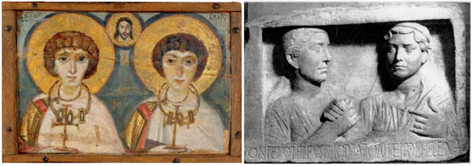
What would happen if the LGBT community did something that no one in the state of Indiana, and apparently no one in the US mainstream media, expects us to do? That is, what if we lesbians, gays, bisexuals and transsexuals claim our entitlement to and protection under the so-called Indiana "Religious Freedom" law sponsored by Governor Mike Pence (which after the initial outcry is now undergoing amendment talks). For all that LGBT Americans would need to do to be covered under the Religious Freedom Law as individuals and as married citizens is to claim that they and their marriage are partaking in a religion or spiritual calling.
I don't mean that we on the spot improvise or fake a ritual and liturgy that purports to sanctify same-sex unions. There's no need for such desperate tactics, given that same sex relations were included within the universal Christian community almost at its origins, and even was bestowed authentic matrimonial liturgies in the Roman and Orthodox Churches from the fourth-to-twelfth centuries.
Sadly, by the twelfth century, same sex marriages were gradually discontinued. And there seems to be no clear record or known reason why. Even the Catholic and Orthodox clergy are largely unaware that there were once nuptial liturgies performed by priests just for same-sex congregants of the Roman and Greek Churches. But that doesn't mean that the sanctity of the nuptial proceedings themselves are null and void.
Indeed, it seems that all around the world, especially among formerly colonized peoples who were once denied their ancestor's indigenous faiths are renewing the old rituals and liturgies once they learn what they were.
I don't mean that we on the spot improvise or fake a ritual and liturgy that purports to sanctify same-sex unions. There's no need for such desperate tactics, given that same sex relations were included within the universal Christian community almost at its origins, and even was bestowed authentic matrimonial liturgies in the Roman and Orthodox Churches from the fourth-to-twelfth centuries.
Sadly, by the twelfth century, same sex marriages were gradually discontinued. And there seems to be no clear record or known reason why. Even the Catholic and Orthodox clergy are largely unaware that there were once nuptial liturgies performed by priests just for same-sex congregants of the Roman and Greek Churches. But that doesn't mean that the sanctity of the nuptial proceedings themselves are null and void.
Indeed, it seems that all around the world, especially among formerly colonized peoples who were once denied their ancestor's indigenous faiths are renewing the old rituals and liturgies once they learn what they were.
Puerto Rico's formal opposition to gay marriage is over

Puerto Rico's formal opposition to gay marriage is over, the government announced Friday —- a step in the right direction you beautiful babies!
From Time:
Justice Secretary Cesar Miranda said at a news conference that the Puerto Rican justice department would no longer oppose a suit challenging the constitutionality of the socially conservative island's ban.
"Our constitutional system does not allow discriminatory distinctions such as that contained in the Civil Code concerning the rights of same-sex couples," Gov. Alejandro Garcia Padilla said in a statement posted to his office's website. "Everyone knows my religious beliefs, but it is not for political leaders to impose our beliefs. We must push for progress in civil and human rights for all citizens equally. As Governor of Puerto Rico, that's my duty."
According to Reuters, yesterday's decision had its humble beginnings in Boston, USA:
The announcement coincided with the filing of a government brief before the 1st Circuit Court of Appeals in Boston, where the Puerto Rico law is being challenged.
The Caribbean island, which is a U.S. territory, said it would no longer defend Article 68 of its Civil Code which contains the same sex marriage rules.
This new law opens the doors to realizing gay marriage in Puerto Rico. Ricky Martin is very pleased. "Today is a great day for my island, the heart out of my chest. How proud I am to live in a country of equality. I love you Puerto Rico," he said in a Twitter message. True. true.
In honor of that, here's this:
From Time:
Justice Secretary Cesar Miranda said at a news conference that the Puerto Rican justice department would no longer oppose a suit challenging the constitutionality of the socially conservative island's ban.
"Our constitutional system does not allow discriminatory distinctions such as that contained in the Civil Code concerning the rights of same-sex couples," Gov. Alejandro Garcia Padilla said in a statement posted to his office's website. "Everyone knows my religious beliefs, but it is not for political leaders to impose our beliefs. We must push for progress in civil and human rights for all citizens equally. As Governor of Puerto Rico, that's my duty."
According to Reuters, yesterday's decision had its humble beginnings in Boston, USA:
The announcement coincided with the filing of a government brief before the 1st Circuit Court of Appeals in Boston, where the Puerto Rico law is being challenged.
The Caribbean island, which is a U.S. territory, said it would no longer defend Article 68 of its Civil Code which contains the same sex marriage rules.
This new law opens the doors to realizing gay marriage in Puerto Rico. Ricky Martin is very pleased. "Today is a great day for my island, the heart out of my chest. How proud I am to live in a country of equality. I love you Puerto Rico," he said in a Twitter message. True. true.
In honor of that, here's this:
Obama administration formally supports nationwide gay marriage
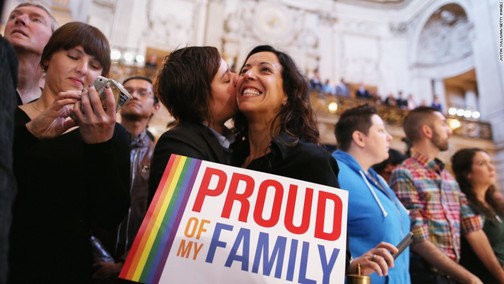
Washington (CNN)
Calling state bans on same-sex marriage "incompatible with the Constitution," the Obama administration Friday filed a brief at the U.S. Supreme Court in support of couples who are making challenges in Kentucky, Michigan, Ohio and Tennessee.
"The marriage bans challenged in these cases impermissibly exclude lesbian and gay couples from the rights, responsibilities and status of civil marriage," Solicitor General Donald B. Verrilli Jr. wrote. He said the states have "burdened petitioners in every aspect of life that marriage touches, from the mundane to the profound."
The brief marks the first time the administration has formally made a filing with the high court supporting its position that bans on gay marriage should be declared unconstitutional nationwide.
The court will hear arguments in the state cases on April 28.
Verrilli said the laws "impose concrete harms on same-sex couples and send the inescapable message that same-sex couples and their children are second-class families, unworthy of the recognition and benefits that opposite-sex couples take for granted."
The bans, he said, "cannot be reconciled with the fundamental constitutional guarantee of equal protection of the laws." He said there is "no adequate justification for such a discriminatory and injurious exercise of state control."
Verrilli stressed that throughout history lesbian and gay people have encountered numerous barriers that have "prevented them from full, free, and equal participation in American life."
In an op-ed earlier this week , published in USA Today, Attorney General Eric Holder wrote, "Marriage equality is an idea whose time has come."
President Barack Obama's position on same-sex marriage has evolved.
In May 2012, in an interview with ABC News, he announced his support for gay marriage. "At a certain point," he said, "I've just concluded that for me, personally, it is important for me to go ahead and affirm that I think same-sex couples should be able to get married."
At his 2013 inauguration he said, "Our journey is not complete until our gay brothers and sisters are treated like anyone else under the law."
In February 2013, the administration filed a friend of the court brief on behalf of couples challenging California's ban on same sex marriage. Verilli argued that California law provided same sex couples registered as domestic partners all the legal incidents of marriage, but denied them the "designation of marriage." Ultimately, the Supreme Court dismissed that case.
Supporters of the state bans have until the end of the month to file their briefs. Thursday was the deadline for briefs in support of petitioners.
James Obergefell, the named plaintiff in the case, came to the court Friday as the Human Rights Campaign delivered a brief signed by over 200,000 individuals in support of same-sex marriage.
In an interview, Obergefell said his journey began when he challenged Ohio's refusal to recognize same-sex marriage on death certificates. He was legally married to his partner, John Arthur James, in Maryland in 2013, but after Arthur died, Ohio officials refused to recognize Obergefell as his spouse.
Asked what it would mean to him if his side wins, Obergefell said, " It will mean John and I matter. It will mean we have the same rights and responsibilities as other Americans."
Calling state bans on same-sex marriage "incompatible with the Constitution," the Obama administration Friday filed a brief at the U.S. Supreme Court in support of couples who are making challenges in Kentucky, Michigan, Ohio and Tennessee.
"The marriage bans challenged in these cases impermissibly exclude lesbian and gay couples from the rights, responsibilities and status of civil marriage," Solicitor General Donald B. Verrilli Jr. wrote. He said the states have "burdened petitioners in every aspect of life that marriage touches, from the mundane to the profound."
The brief marks the first time the administration has formally made a filing with the high court supporting its position that bans on gay marriage should be declared unconstitutional nationwide.
The court will hear arguments in the state cases on April 28.
Verrilli said the laws "impose concrete harms on same-sex couples and send the inescapable message that same-sex couples and their children are second-class families, unworthy of the recognition and benefits that opposite-sex couples take for granted."
The bans, he said, "cannot be reconciled with the fundamental constitutional guarantee of equal protection of the laws." He said there is "no adequate justification for such a discriminatory and injurious exercise of state control."
Verrilli stressed that throughout history lesbian and gay people have encountered numerous barriers that have "prevented them from full, free, and equal participation in American life."
In an op-ed earlier this week , published in USA Today, Attorney General Eric Holder wrote, "Marriage equality is an idea whose time has come."
President Barack Obama's position on same-sex marriage has evolved.
In May 2012, in an interview with ABC News, he announced his support for gay marriage. "At a certain point," he said, "I've just concluded that for me, personally, it is important for me to go ahead and affirm that I think same-sex couples should be able to get married."
At his 2013 inauguration he said, "Our journey is not complete until our gay brothers and sisters are treated like anyone else under the law."
In February 2013, the administration filed a friend of the court brief on behalf of couples challenging California's ban on same sex marriage. Verilli argued that California law provided same sex couples registered as domestic partners all the legal incidents of marriage, but denied them the "designation of marriage." Ultimately, the Supreme Court dismissed that case.
Supporters of the state bans have until the end of the month to file their briefs. Thursday was the deadline for briefs in support of petitioners.
James Obergefell, the named plaintiff in the case, came to the court Friday as the Human Rights Campaign delivered a brief signed by over 200,000 individuals in support of same-sex marriage.
In an interview, Obergefell said his journey began when he challenged Ohio's refusal to recognize same-sex marriage on death certificates. He was legally married to his partner, John Arthur James, in Maryland in 2013, but after Arthur died, Ohio officials refused to recognize Obergefell as his spouse.
Asked what it would mean to him if his side wins, Obergefell said, " It will mean John and I matter. It will mean we have the same rights and responsibilities as other Americans."
Conservatives filing brief in favor of gay marriage
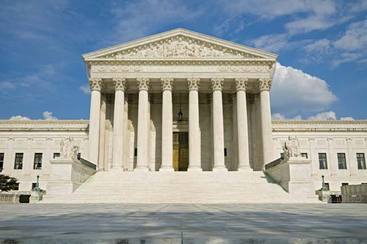
By Jennifer Rubin March 3 at 10:15 AM
Right Turn has learned that an impressive array of Republicans and Gen. Stanley McChrystal will be filing an amicus brief on Friday in support of gay marriage with the Supreme Court in DeBoer v. Snyder. The case will decide, in the wake of cases striking down the Defense of Marriage Act, if states can restrict marriage to heterosexual couples or if gay marriage falls within the protection afforded by the 14th Amendment.
The Supreme Court building in Washington. (Karen Bleier/Agence France-Presse via Getty Images)
The brief’s signatories include former Republican National Committee chairman Ken Mehlman, conservative pundits S.E. Cupp and Alex Castellanos, former White House chief of staff Ken Duberstein, former Mitt Romney senior advisers Beth Myers and Carl Forti, conservative economists Doug Holtz-Eakin (formerly director of the Congressional Budget Office) and Greg Mankiw (formerly on the Council of Economic Advisers), former senator Alan Simpson (R-Wyo.), former homeland security adviser Fran Townsend and former Massachusetts state Senate minority leader Richard Tisei. The presence of an esteemed general suggests that there is no segment of society in which gay marriage is not gaining acceptance. There are on the list centrist Republicans, more libertarian figures and even social conservatives. In a phone interview Mehlman said, “I think the diversity of the people is a reflection of what we have seen which is increased support in every demographic [for gay marriage].”
In the brief, the signatories argue that they “have concluded that marriage is strengthened, and its value to society and to individual families and couples is promoted, by providing access to civil marriage for all American couples—heterosexual or gay or lesbian alike. In particular, civil marriage provides stability for the children of same-sex couples, the value of which cannot be overestimated. In light of these conclusions, amici believe that the Fourteenth Amendment prohibits States from denying same-sex couples the legal rights and responsibilities that flow from the institution of civil marriage.” They argue that their belief in judicial restraint nevertheless is informed by their understanding that our “constitutional tradition empowers and requires the judiciary to protect our most cherished liberties against overreaching by the government, including overreach through an act of legislature or electorate. That principle, no less than our commitment to democratic self-government, is necessary to individual freedom and limited government.”
The signatories also argue from precedent that marriage is a fundamental right that enhances liberty. (“For those who choose to marry, the rights and responsibilities conveyed by civil marriage provide a bulwark against unwarranted government intervention into deeply personal concerns such as medical and child-rearing decisions.”) The brief contends, “It is precisely because marriage is so important in producing and protecting strong and stable family structures that the goal of strengthening families favors civil marriage for same-sex couples.” They make the case that even under the lowest level of 14th Amendment scrutiny, banning gay marriage cannot be defended:
Amici do not believe there is a legitimate, fact based justification for excluding same-sex couples from civil marriage. Over the past two decades, the arguments presented by proponents of such initiatives have been discredited by social science, rejected by courts, and contradicted by amici’s personal experience with same-sex couples, including those whose civil marriages have been legally performed and recognized in various States. Amici thus do not believe that any “reasonable support in fact” exists for arguments that allowing same-sex couples to join in civil marriage will damage or distort the institution, jeopardize children, or cause any other social ills. Rather, the facts and evidence show that permitting civil marriage for same sex couples will enhance the institution, protect children, and benefit society generally. Banning marriage for same-sex couples, in contrast, undermines these critical societal goals: Such bans impede family formation, harm children, and discourage fidelity, responsibility, and stability.
Put differently in layman’s terms, marriage confirms benefits and there are insufficient policy reasons to deprive gay couples of those benefits. Mehlman says, “The more people see gay couples getting married, the more they will see that marriage is a good thing.” With marriage, he says, “Freedom advances. Family values advance.” Mehlman thinks a decision in favor of gay marriage will be readily accepted. “I’ve noticed Republicans and conservatives respect the law,” he says of the reaction to previous cases. Indeed, it is remarkable how little discussion of gay marriage there has been in the presidential race. While potential candidates continue to voice their view that they “believe in traditional marriage,” many — including Wisconsin Gov. Scott Walker, New Jersey Gov. Chris Christie and former Florida governor Jeb Bush — have all affirmed that they abide by court decisions. There is no real movement to defy the courts, and given the shift in opinions, it is nearly inconceivable that enough states could be induced to sign up for a constitutional amendment banning gay marriage.
Unlike abortion, which even proponents of abortion rights usually concede is a bad thing, gay marriage — no matter how its opponents might struggle — has not proved to be destructive or harmful in states where it has been adopted. The premise that gay marriage harms heterosexual marriage has never been very compelling. The longer Americans live with gay marriage, the less of an issue it seems to become. Americans remain a tolerant and accepting people. One strongly suspects that the court will agree with the signatories and thereby put the issue to rest as a legal matter. For many Americans, it is already a non-issue, and I agree with Mehlman that the rest will acknowledge once the court speaks that there is no turning the clock back.
Right Turn has learned that an impressive array of Republicans and Gen. Stanley McChrystal will be filing an amicus brief on Friday in support of gay marriage with the Supreme Court in DeBoer v. Snyder. The case will decide, in the wake of cases striking down the Defense of Marriage Act, if states can restrict marriage to heterosexual couples or if gay marriage falls within the protection afforded by the 14th Amendment.
The Supreme Court building in Washington. (Karen Bleier/Agence France-Presse via Getty Images)
The brief’s signatories include former Republican National Committee chairman Ken Mehlman, conservative pundits S.E. Cupp and Alex Castellanos, former White House chief of staff Ken Duberstein, former Mitt Romney senior advisers Beth Myers and Carl Forti, conservative economists Doug Holtz-Eakin (formerly director of the Congressional Budget Office) and Greg Mankiw (formerly on the Council of Economic Advisers), former senator Alan Simpson (R-Wyo.), former homeland security adviser Fran Townsend and former Massachusetts state Senate minority leader Richard Tisei. The presence of an esteemed general suggests that there is no segment of society in which gay marriage is not gaining acceptance. There are on the list centrist Republicans, more libertarian figures and even social conservatives. In a phone interview Mehlman said, “I think the diversity of the people is a reflection of what we have seen which is increased support in every demographic [for gay marriage].”
In the brief, the signatories argue that they “have concluded that marriage is strengthened, and its value to society and to individual families and couples is promoted, by providing access to civil marriage for all American couples—heterosexual or gay or lesbian alike. In particular, civil marriage provides stability for the children of same-sex couples, the value of which cannot be overestimated. In light of these conclusions, amici believe that the Fourteenth Amendment prohibits States from denying same-sex couples the legal rights and responsibilities that flow from the institution of civil marriage.” They argue that their belief in judicial restraint nevertheless is informed by their understanding that our “constitutional tradition empowers and requires the judiciary to protect our most cherished liberties against overreaching by the government, including overreach through an act of legislature or electorate. That principle, no less than our commitment to democratic self-government, is necessary to individual freedom and limited government.”
The signatories also argue from precedent that marriage is a fundamental right that enhances liberty. (“For those who choose to marry, the rights and responsibilities conveyed by civil marriage provide a bulwark against unwarranted government intervention into deeply personal concerns such as medical and child-rearing decisions.”) The brief contends, “It is precisely because marriage is so important in producing and protecting strong and stable family structures that the goal of strengthening families favors civil marriage for same-sex couples.” They make the case that even under the lowest level of 14th Amendment scrutiny, banning gay marriage cannot be defended:
Amici do not believe there is a legitimate, fact based justification for excluding same-sex couples from civil marriage. Over the past two decades, the arguments presented by proponents of such initiatives have been discredited by social science, rejected by courts, and contradicted by amici’s personal experience with same-sex couples, including those whose civil marriages have been legally performed and recognized in various States. Amici thus do not believe that any “reasonable support in fact” exists for arguments that allowing same-sex couples to join in civil marriage will damage or distort the institution, jeopardize children, or cause any other social ills. Rather, the facts and evidence show that permitting civil marriage for same sex couples will enhance the institution, protect children, and benefit society generally. Banning marriage for same-sex couples, in contrast, undermines these critical societal goals: Such bans impede family formation, harm children, and discourage fidelity, responsibility, and stability.
Put differently in layman’s terms, marriage confirms benefits and there are insufficient policy reasons to deprive gay couples of those benefits. Mehlman says, “The more people see gay couples getting married, the more they will see that marriage is a good thing.” With marriage, he says, “Freedom advances. Family values advance.” Mehlman thinks a decision in favor of gay marriage will be readily accepted. “I’ve noticed Republicans and conservatives respect the law,” he says of the reaction to previous cases. Indeed, it is remarkable how little discussion of gay marriage there has been in the presidential race. While potential candidates continue to voice their view that they “believe in traditional marriage,” many — including Wisconsin Gov. Scott Walker, New Jersey Gov. Chris Christie and former Florida governor Jeb Bush — have all affirmed that they abide by court decisions. There is no real movement to defy the courts, and given the shift in opinions, it is nearly inconceivable that enough states could be induced to sign up for a constitutional amendment banning gay marriage.
Unlike abortion, which even proponents of abortion rights usually concede is a bad thing, gay marriage — no matter how its opponents might struggle — has not proved to be destructive or harmful in states where it has been adopted. The premise that gay marriage harms heterosexual marriage has never been very compelling. The longer Americans live with gay marriage, the less of an issue it seems to become. Americans remain a tolerant and accepting people. One strongly suspects that the court will agree with the signatories and thereby put the issue to rest as a legal matter. For many Americans, it is already a non-issue, and I agree with Mehlman that the rest will acknowledge once the court speaks that there is no turning the clock back.
13 States still ban Same Sex Marriage!
State by State Rulings
Arkansas
The state's constitutional ban on gay marriage, passed in 2004, was struck down twice last year -- once by a state court judge and again by a U.S. District Court judge. Local officials issued some 400 marriage licenses following the state court decision, but the state Supreme Court blocked the issuance of more licenses pending its review of the case. A decision could come soon.
Georgia
Georgia is one of just three states with no legislative action or pending legal decisions whatsoever on same-sex marriage. The others are North Dakota and Nebraska. However, lawsuits are pending to overturn the state's 2004 ban.
Louisiana
The state's ban is being challenged in state court, where a judge last year ruled the law is unconstitutional, and in federal court, where a U.S. District Court judge took there are step, for a federal judge, of backing such a ban. The ban remains in place pending Louisiana's appeal of the state court ruling. On the federal level, a ruling is pending out of the U.S Court of Appeals for the Fifth Circuit, which heard arguments in the case in January.
Kentucky
Last year, a U.S. District Court judge ruled that the state's constitutional amendment banning gay marriages had no "legitimate purpose." The U.S. Court of Appeals for the Sixth Circuit later overturned the ruling, reinstating gay marriage bans in Kentucky and four other states. The Kentucky ban is part of the U.S. Supreme Court case scheduled for arguments in April and a decision by June.
Michigan
Same-sex couples get their marriage licenses at the Oakland County Courthouse on March 22, 2014 in Pontiac, Michigan. A Federal judge overturned Michigan's ban on same-sex marriage on Friday, March 21.
A U.S. District Court judge ruled last year that the state's same-sex marriage ban was unconstitutional, resulting in the issuance of more than 300 marriage licenses. That ended when the U.S. Court of Appeals for the Sixth Circuit granted a stay. The court later reinstated Michigan's ban in the same ruling that reinstated Kentucky's ban. Its fate will be decided by the Supreme Court decision due by June.
Missouri
A state court judge ruled in November that Missouri's 2004 constitutional ban on gay marriage was illegal. Attorney General Chris Koster appealed the ruling to the state Supreme Court. But that court has indicated that it will not rule on the case until after the U.S. Supreme Court decision. Just a few days after that state court ruling, a U.S. District Court judge struck down the state's marriage ban, but that decision has been stayed pending appeals. While the state ban is in effect, officials in the St. Louis area have issued marriage licenses to same-sex couples.
Mississippi
A U.S. District Court judge granted an injunction last year against the state's same-sex marriage ban, describing it as unconstitutional. The judge, however, postponed his ruling from going into effect to give the state time to appeal. A federal appeals court heard arguments in the case in January. In the meantime, the same-sex marriage ban is still in effect.
Nebraska
A decade ago, a federal court ruled than an amendment banning same-sex marriages was unconstitutional. But the decision was short-lived. An appeals court reinstated the ban. Rights groups have filed legal challenges.
North Dakota
Same-sex couples are challenging the state's ban in U.S. District Court, but a federal judge issued a ruling on January 20 delaying the proceedings until after the U.S. Supreme Court rules.
South Dakota
U.S. District Court Judge Karen Schreier struck down the state's same-sex marriage ban in January, but blocked enforcement pending an appeal to the U.S. Court of Appeals for the Eighth Circuit.
Texas
The state's ban was struck down in January 2014 by a federal judge who said it serves "no legitimate governmental purpose." But, as in many other states, enforcement was delayed pending appeals. The U.S. Court of Appeals for the Fifth Circuit heard the case last month and a ruling is pending.
Ohio
A federal appeals court judge upheld a ban last year on same-sex marriages in the state. That decision is part of the U.S. Supreme Court case expected to be finalized this summer.
Tennessee
In November 2014, the U.S. Court of Appeals for the Sixth Circuit upheld the state's ban. That decision also will be part of the U.S. Supreme Court case.
Copyright ©2000-2017 gaysuffrage.com
[email protected]
All Rights Reserved.
No part of this website can be copied, replicated, or used without written permission from gaysuffrage.com.
gaysuffrage.com is privately owned.

